Should Kids Get Homework?
Homework gives elementary students a way to practice concepts, but too much can be harmful, experts say.

Getty Images
Effective homework reinforces math, reading, writing or spelling skills, but in a way that's meaningful.
How much homework students should get has long been a source of debate among parents and educators. In recent years, some districts have even implemented no-homework policies, as students juggle sports, music and other activities after school.
Parents of elementary school students, in particular, have argued that after-school hours should be spent with family or playing outside rather than completing assignments. And there is little research to show that homework improves academic achievement for elementary students.
But some experts say there's value in homework, even for younger students. When done well, it can help students practice core concepts and develop study habits and time management skills. The key to effective homework, they say, is keeping assignments related to classroom learning, and tailoring the amount by age: Many experts suggest no homework for kindergartners, and little to none in first and second grade.

Value of Homework
Homework provides a chance to solidify what is being taught in the classroom that day, week or unit. Practice matters, says Janine Bempechat, clinical professor at Boston University 's Wheelock College of Education & Human Development.
"There really is no other domain of human ability where anybody would say you don't need to practice," she adds. "We have children practicing piano and we have children going to sports practice several days a week after school. You name the domain of ability and practice is in there."
Homework is also the place where schools and families most frequently intersect.
"The children are bringing things from the school into the home," says Paula S. Fass, professor emerita of history at the University of California—Berkeley and the author of "The End of American Childhood." "Before the pandemic, (homework) was the only real sense that parents had to what was going on in schools."
Harris Cooper, professor emeritus of psychology and neuroscience at Duke University and author of "The Battle Over Homework," examined more than 60 research studies on homework between 1987 and 2003 and found that — when designed properly — homework can lead to greater student success. Too much, however, is harmful. And homework has a greater positive effect on students in secondary school (grades 7-12) than those in elementary.
"Every child should be doing homework, but the amount and type that they're doing should be appropriate for their developmental level," he says. "For teachers, it's a balancing act. Doing away with homework completely is not in the best interest of children and families. But overburdening families with homework is also not in the child's or a family's best interest."
Negative Homework Assignments
Not all homework for elementary students involves completing a worksheet. Assignments can be fun, says Cooper, like having students visit educational locations, keep statistics on their favorite sports teams, read for pleasure or even help their parents grocery shop. The point is to show students that activities done outside of school can relate to subjects learned in the classroom.
But assignments that are just busy work, that force students to learn new concepts at home, or that are overly time-consuming can be counterproductive, experts say.
Homework that's just busy work.
Effective homework reinforces math, reading, writing or spelling skills, but in a way that's meaningful, experts say. Assignments that look more like busy work – projects or worksheets that don't require teacher feedback and aren't related to topics learned in the classroom – can be frustrating for students and create burdens for families.
"The mental health piece has definitely played a role here over the last couple of years during the COVID-19 pandemic, and the last thing we want to do is frustrate students with busy work or homework that makes no sense," says Dave Steckler, principal of Red Trail Elementary School in Mandan, North Dakota.
Homework on material that kids haven't learned yet.
With the pressure to cover all topics on standardized tests and limited time during the school day, some teachers assign homework that has not yet been taught in the classroom.
Not only does this create stress, but it also causes equity challenges. Some parents speak languages other than English or work several jobs, and they aren't able to help teach their children new concepts.
" It just becomes agony for both parents and the kids to get through this worksheet, and the goal becomes getting to the bottom of (the) worksheet with answers filled in without any understanding of what any of it matters for," says professor Susan R. Goldman, co-director of the Learning Sciences Research Institute at the University of Illinois—Chicago .
Homework that's overly time-consuming.
The standard homework guideline recommended by the National Parent Teacher Association and the National Education Association is the "10-minute rule" – 10 minutes of nightly homework per grade level. A fourth grader, for instance, would receive a total of 40 minutes of homework per night.
But this does not always happen, especially since not every student learns the same. A 2015 study published in the American Journal of Family Therapy found that primary school children actually received three times the recommended amount of homework — and that family stress increased along with the homework load.
Young children can only remain attentive for short periods, so large amounts of homework, especially lengthy projects, can negatively affect students' views on school. Some individual long-term projects – like having to build a replica city, for example – typically become an assignment for parents rather than students, Fass says.
"It's one thing to assign a project like that in which several kids are working on it together," she adds. "In (that) case, the kids do normally work on it. It's another to send it home to the families, where it becomes a burden and doesn't really accomplish very much."
Private vs. Public Schools
Do private schools assign more homework than public schools? There's little research on the issue, but experts say private school parents may be more accepting of homework, seeing it as a sign of academic rigor.
Of course, not all private schools are the same – some focus on college preparation and traditional academics, while others stress alternative approaches to education.
"I think in the academically oriented private schools, there's more support for homework from parents," says Gerald K. LeTendre, chair of educational administration at Pennsylvania State University—University Park . "I don't know if there's any research to show there's more homework, but it's less of a contentious issue."
How to Address Homework Overload
First, assess if the workload takes as long as it appears. Sometimes children may start working on a homework assignment, wander away and come back later, Cooper says.
"Parents don't see it, but they know that their child has started doing their homework four hours ago and still not done it," he adds. "They don't see that there are those four hours where their child was doing lots of other things. So the homework assignment itself actually is not four hours long. It's the way the child is approaching it."
But if homework is becoming stressful or workload is excessive, experts suggest parents first approach the teacher, followed by a school administrator.
"Many times, we can solve a lot of issues by having conversations," Steckler says, including by "sitting down, talking about the amount of homework, and what's appropriate and not appropriate."
Study Tips for High School Students

Tags: K-12 education , students , elementary school , children
2024 Best Colleges

Search for your perfect fit with the U.S. News rankings of colleges and universities.

School Life Balance , Tips for Online Students
The Pros and Cons of Homework
Updated: December 7, 2023
Published: January 23, 2020

Homework is a word that most students dread hearing. After hours upon hours of sitting in class , the last thing we want is more schoolwork over our precious weekends. While it’s known to be a staple of traditional schooling, homework has also become a rather divise topic. Some feel as though homework is a necessary part of school, while others believe that the time could be better invested. Should students have homework? Have a closer look into the arguments on both sides to decide for yourself.

Photo by energepic.com from Pexels
Why should students have homework, 1. homework encourages practice.
Many people believe that one of the positive effects of homework is that it encourages the discipline of practice. While it may be time consuming and boring compared to other activities, repetition is needed to get better at skills. Homework helps make concepts more clear, and gives students more opportunities when starting their career .
2. Homework Gets Parents Involved
Homework can be something that gets parents involved in their children’s lives if the environment is a healthy one. A parent helping their child with homework makes them take part in their academic success, and allows for the parent to keep up with what the child is doing in school. It can also be a chance to connect together.
3. Homework Teaches Time Management
Homework is much more than just completing the assigned tasks. Homework can develop time management skills , forcing students to plan their time and make sure that all of their homework assignments are done on time. By learning to manage their time, students also practice their problem-solving skills and independent thinking. One of the positive effects of homework is that it forces decision making and compromises to be made.
4. Homework Opens A Bridge Of Communication
Homework creates a connection between the student, the teacher, the school, and the parents. It allows everyone to get to know each other better, and parents can see where their children are struggling. In the same sense, parents can also see where their children are excelling. Homework in turn can allow for a better, more targeted educational plan for the student.
5. Homework Allows For More Learning Time
Homework allows for more time to complete the learning process. School hours are not always enough time for students to really understand core concepts, and homework can counter the effects of time shortages, benefiting students in the long run, even if they can’t see it in the moment.
6. Homework Reduces Screen Time
Many students in North America spend far too many hours watching TV. If they weren’t in school, these numbers would likely increase even more. Although homework is usually undesired, it encourages better study habits and discourages spending time in front of the TV. Homework can be seen as another extracurricular activity, and many families already invest a lot of time and money in different clubs and lessons to fill up their children’s extra time. Just like extracurricular activities, homework can be fit into one’s schedule.

The Other Side: Why Homework Is Bad
1. homework encourages a sedentary lifestyle.
Should students have homework? Well, that depends on where you stand. There are arguments both for the advantages and the disadvantages of homework.
While classroom time is important, playground time is just as important. If children are given too much homework, they won’t have enough playtime, which can impact their social development and learning. Studies have found that those who get more play get better grades in school , as it can help them pay closer attention in the classroom.
Children are already sitting long hours in the classroom, and homework assignments only add to these hours. Sedentary lifestyles can be dangerous and can cause health problems such as obesity. Homework takes away from time that could be spent investing in physical activity.
2. Homework Isn’t Healthy In Every Home
While many people that think homes are a beneficial environment for children to learn, not all homes provide a healthy environment, and there may be very little investment from parents. Some parents do not provide any kind of support or homework help, and even if they would like to, due to personal barriers, they sometimes cannot. Homework can create friction between children and their parents, which is one of the reasons why homework is bad .
3. Homework Adds To An Already Full-Time Job
School is already a full-time job for students, as they generally spend over 6 hours each day in class. Students also often have extracurricular activities such as sports, music, or art that are just as important as their traditional courses. Adding on extra hours to all of these demands is a lot for children to manage, and prevents students from having extra time to themselves for a variety of creative endeavors. Homework prevents self discovery and having the time to learn new skills outside of the school system. This is one of the main disadvantages of homework.
4. Homework Has Not Been Proven To Provide Results
Endless surveys have found that homework creates a negative attitude towards school, and homework has not been found to be linked to a higher level of academic success.
The positive effects of homework have not been backed up enough. While homework may help some students improve in specific subjects, if they have outside help there is no real proof that homework makes for improvements.
It can be a challenge to really enforce the completion of homework, and students can still get decent grades without doing their homework. Extra school time does not necessarily mean better grades — quality must always come before quantity.
Accurate practice when it comes to homework simply isn’t reliable. Homework could even cause opposite effects if misunderstood, especially since the reliance is placed on the student and their parents — one of the major reasons as to why homework is bad. Many students would rather cheat in class to avoid doing their homework at home, and children often just copy off of each other or from what they read on the internet.
5. Homework Assignments Are Overdone
The general agreement is that students should not be given more than 10 minutes a day per grade level. What this means is that a first grader should be given a maximum of 10 minutes of homework, while a second grader receives 20 minutes, etc. Many students are given a lot more homework than the recommended amount, however.
On average, college students spend as much as 3 hours per night on homework . By giving too much homework, it can increase stress levels and lead to burn out. This in turn provides an opposite effect when it comes to academic success.
The pros and cons of homework are both valid, and it seems as though the question of ‘‘should students have homework?’ is not a simple, straightforward one. Parents and teachers often are found to be clashing heads, while the student is left in the middle without much say.
It’s important to understand all the advantages and disadvantages of homework, taking both perspectives into conversation to find a common ground. At the end of the day, everyone’s goal is the success of the student.
Related Articles

Is Homework Good for Kids?
Research suggests that homework may be most beneficial when it is minimal..
Updated October 3, 2023 | Reviewed by Devon Frye
- Why Education Is Important
- Find a Child Therapist
- Research finds that homework can academically benefit middle and high schoolers, but not elementary students.
- There are non-academic benefits to homework, but too much work may interfere with other areas of development.
- Research suggests students should be given about 10 minutes of homework per grade level.
- Parents can help with homework by encouraging a growth mindset and supporting their child's autonomy.
In recent years, homework has become a very hot topic. Many parents and educators have raised concerns about homework and questioned how effective it is in enhancing students’ learning. There are also concerns that students may simply be getting too much homework, which ultimately interferes with quality family time and opportunities for physical activity and play.
Research suggests that these concerns may be valid. For example, one study reported that elementary school students, on average, are assigned three times the recommended amount of homework.
What does the research say? What are the potential risks and benefits of homework, and how much is “too much”?
Academic vs. Non-Academic Benefits
First, research finds that homework is associated with higher scores on academic standardized tests for middle and high school students, but not elementary school students . A recent experimental study in Romania found some benefits for a small amount of writing homework in elementary students but not math homework. Yet, interestingly, this positive impact only occurred when students were given a moderate amount of homework (about 20 minutes on average).
Yet the goal of homework is not simply to improve academic skills. Research finds that homework may have some non-academic benefits, such as building responsibility , time management skills, and task persistence . Homework may also increase parents’ involvement in their children’s schooling.
Yet too much homework may also have some negative impacts on non-academic skills by reducing opportunities for free play , which is essential for the development of language, cognitive, self-regulation , and social-emotional skills. Homework may also interfere with physical activity ; indeed, too much homework is associated with an increased risk of being overweight . As with the research on academic benefits, this research also suggests that homework may be beneficial when it is minimal.
What is the “Right” Amount of Homework?
Research suggests that homework should not exceed 1.5 to 2.5 hours per night for high school students and no more than 1 hour per night for middle school students. Homework for elementary school students should be minimal and assigned with the aim of building self-regulation and independent work skills. Any more than this and homework may no longer have a positive impact.
The National Education Association recommends 10 minutes of homework per grade and there is also some experimental evidence that backs this up.
What Can Parents Do?
Research finds that parental help with homework is beneficial but that it matters more how the parent is helping rather than how often the parent is helping.
So how should parents help with homework (according to the research)?
- Focus on providing general monitoring, guidance, and encouragement, but allow children to complete their homework as independently as possible. Research shows that allowing children more autonomy in completing homework may benefit their academic skills.
- Only provide help when your child asks for it and step away whenever possible. Research finds that too much parental involvement or intrusive and controlling involvement with homework is associated with worse academic performance .
- Help your children to create structure and develop some routines that help your child to independently complete their homework. Research finds that providing this type of structure and responsiveness is related to improved academic skills.
- Set specific rules around homework. Research finds an association between parents setting rules around homework and academic performance.
- Help your child to view homework as an opportunity to learn and improve skills. Parents who view homework as a learning opportunity (that is, a “mastery orientation”) rather than something that they must get “right” or complete successfully to obtain a higher grade (that is, a “performance orientation”) are more likely to have children with the same attitudes.
- Encourage your child to persist in challenging assignments and emphasize difficult assignments as opportunities to grow. Research finds that this attitude is associated with student success. Research also indicates that more challenging homework is associated with enhanced academic performance.
- Stay calm and positive during homework. Research shows that mothers’ showing positive emotions while helping with homework may improve children’s motivation in homework.
- Praise your child’s hard work and effort during homework. This type of praise is likely to increase motivation. In addition, research finds that putting more effort into homework may be associated with enhanced development of conscientiousness in children.
- Communicate with your child and the teacher about any problems your child has with homework and the teacher’s learning goals. Research finds that open communication about homework is associated with increased academic performance.

Cara Goodwin, Ph.D., is a licensed clinical psychologist who specializes in translating scientific research into information that is useful, accurate, and relevant for parents.
- Find a Therapist
- Find a Treatment Center
- Find a Psychiatrist
- Find a Support Group
- Find Online Therapy
- United States
- Brooklyn, NY
- Chicago, IL
- Houston, TX
- Los Angeles, CA
- New York, NY
- Portland, OR
- San Diego, CA
- San Francisco, CA
- Seattle, WA
- Washington, DC
- Asperger's
- Bipolar Disorder
- Chronic Pain
- Eating Disorders
- Passive Aggression
- Personality
- Goal Setting
- Positive Psychology
- Stopping Smoking
- Low Sexual Desire
- Relationships
- Child Development
- Therapy Center NEW
- Diagnosis Dictionary
- Types of Therapy

Understanding what emotional intelligence looks like and the steps needed to improve it could light a path to a more emotionally adept world.
- Emotional Intelligence
- Gaslighting
- Affective Forecasting
- Neuroscience
Is Homework Good for Kids? Here’s What the Research Says
A s kids return to school, debate is heating up once again over how they should spend their time after they leave the classroom for the day.
The no-homework policy of a second-grade teacher in Texas went viral last week , earning praise from parents across the country who lament the heavy workload often assigned to young students. Brandy Young told parents she would not formally assign any homework this year, asking students instead to eat dinner with their families, play outside and go to bed early.
But the question of how much work children should be doing outside of school remains controversial, and plenty of parents take issue with no-homework policies, worried their kids are losing a potential academic advantage. Here’s what you need to know:
For decades, the homework standard has been a “10-minute rule,” which recommends a daily maximum of 10 minutes of homework per grade level. Second graders, for example, should do about 20 minutes of homework each night. High school seniors should complete about two hours of homework each night. The National PTA and the National Education Association both support that guideline.
But some schools have begun to give their youngest students a break. A Massachusetts elementary school has announced a no-homework pilot program for the coming school year, lengthening the school day by two hours to provide more in-class instruction. “We really want kids to go home at 4 o’clock, tired. We want their brain to be tired,” Kelly Elementary School Principal Jackie Glasheen said in an interview with a local TV station . “We want them to enjoy their families. We want them to go to soccer practice or football practice, and we want them to go to bed. And that’s it.”
A New York City public elementary school implemented a similar policy last year, eliminating traditional homework assignments in favor of family time. The change was quickly met with outrage from some parents, though it earned support from other education leaders.
New solutions and approaches to homework differ by community, and these local debates are complicated by the fact that even education experts disagree about what’s best for kids.
The research
The most comprehensive research on homework to date comes from a 2006 meta-analysis by Duke University psychology professor Harris Cooper, who found evidence of a positive correlation between homework and student achievement, meaning students who did homework performed better in school. The correlation was stronger for older students—in seventh through 12th grade—than for those in younger grades, for whom there was a weak relationship between homework and performance.
Cooper’s analysis focused on how homework impacts academic achievement—test scores, for example. His report noted that homework is also thought to improve study habits, attitudes toward school, self-discipline, inquisitiveness and independent problem solving skills. On the other hand, some studies he examined showed that homework can cause physical and emotional fatigue, fuel negative attitudes about learning and limit leisure time for children. At the end of his analysis, Cooper recommended further study of such potential effects of homework.
Despite the weak correlation between homework and performance for young children, Cooper argues that a small amount of homework is useful for all students. Second-graders should not be doing two hours of homework each night, he said, but they also shouldn’t be doing no homework.
Not all education experts agree entirely with Cooper’s assessment.
Cathy Vatterott, an education professor at the University of Missouri-St. Louis, supports the “10-minute rule” as a maximum, but she thinks there is not sufficient proof that homework is helpful for students in elementary school.
“Correlation is not causation,” she said. “Does homework cause achievement, or do high achievers do more homework?”
Vatterott, the author of Rethinking Homework: Best Practices That Support Diverse Needs , thinks there should be more emphasis on improving the quality of homework tasks, and she supports efforts to eliminate homework for younger kids.
“I have no concerns about students not starting homework until fourth grade or fifth grade,” she said, noting that while the debate over homework will undoubtedly continue, she has noticed a trend toward limiting, if not eliminating, homework in elementary school.
The issue has been debated for decades. A TIME cover in 1999 read: “Too much homework! How it’s hurting our kids, and what parents should do about it.” The accompanying story noted that the launch of Sputnik in 1957 led to a push for better math and science education in the U.S. The ensuing pressure to be competitive on a global scale, plus the increasingly demanding college admissions process, fueled the practice of assigning homework.
“The complaints are cyclical, and we’re in the part of the cycle now where the concern is for too much,” Cooper said. “You can go back to the 1970s, when you’ll find there were concerns that there was too little, when we were concerned about our global competitiveness.”
Cooper acknowledged that some students really are bringing home too much homework, and their parents are right to be concerned.
“A good way to think about homework is the way you think about medications or dietary supplements,” he said. “If you take too little, they’ll have no effect. If you take too much, they can kill you. If you take the right amount, you’ll get better.”
More Must-Reads From TIME
- What Student Photojournalists Saw at the Campus Protests
- Women Say They Were Pressured Into Long-Term Birth Control
- How Far Trump Would Go
- Scientists Are Finding Out Just How Toxic Your Stuff Is
- Boredom Makes Us Human : Column
- John Mulaney Has What Late Night Needs
- The 100 Most Influential People of 2024
- Want Weekly Recs on What to Watch, Read, and More? Sign Up for Worth Your Time
Write to Katie Reilly at [email protected]
Does homework really work?
by: Leslie Crawford | Updated: December 12, 2023
Print article

You know the drill. It’s 10:15 p.m., and the cardboard-and-toothpick Golden Gate Bridge is collapsing. The pages of polynomials have been abandoned. The paper on the Battle of Waterloo seems to have frozen in time with Napoleon lingering eternally over his breakfast at Le Caillou. Then come the tears and tantrums — while we parents wonder, Does the gain merit all this pain? Is this just too much homework?
However the drama unfolds night after night, year after year, most parents hold on to the hope that homework (after soccer games, dinner, flute practice, and, oh yes, that childhood pastime of yore known as playing) advances their children academically.
But what does homework really do for kids? Is the forest’s worth of book reports and math and spelling sheets the average American student completes in their 12 years of primary schooling making a difference? Or is it just busywork?
Homework haterz
Whether or not homework helps, or even hurts, depends on who you ask. If you ask my 12-year-old son, Sam, he’ll say, “Homework doesn’t help anything. It makes kids stressed-out and tired and makes them hate school more.”
Nothing more than common kid bellyaching?
Maybe, but in the fractious field of homework studies, it’s worth noting that Sam’s sentiments nicely synopsize one side of the ivory tower debate. Books like The End of Homework , The Homework Myth , and The Case Against Homework the film Race to Nowhere , and the anguished parent essay “ My Daughter’s Homework is Killing Me ” make the case that homework, by taking away precious family time and putting kids under unneeded pressure, is an ineffective way to help children become better learners and thinkers.
One Canadian couple took their homework apostasy all the way to the Supreme Court of Canada. After arguing that there was no evidence that it improved academic performance, they won a ruling that exempted their two children from all homework.
So what’s the real relationship between homework and academic achievement?
How much is too much?
To answer this question, researchers have been doing their homework on homework, conducting and examining hundreds of studies. Chris Drew Ph.D., founder and editor at The Helpful Professor recently compiled multiple statistics revealing the folly of today’s after-school busy work. Does any of the data he listed below ring true for you?
• 45 percent of parents think homework is too easy for their child, primarily because it is geared to the lowest standard under the Common Core State Standards .
• 74 percent of students say homework is a source of stress , defined as headaches, exhaustion, sleep deprivation, weight loss, and stomach problems.
• Students in high-performing high schools spend an average of 3.1 hours a night on homework , even though 1 to 2 hours is the optimal duration, according to a peer-reviewed study .
Not included in the list above is the fact many kids have to abandon activities they love — like sports and clubs — because homework deprives them of the needed time to enjoy themselves with other pursuits.
Conversely, The Helpful Professor does list a few pros of homework, noting it teaches discipline and time management, and helps parents know what’s being taught in the class.
The oft-bandied rule on homework quantity — 10 minutes a night per grade (starting from between 10 to 20 minutes in first grade) — is listed on the National Education Association’s website and the National Parent Teacher Association’s website , but few schools follow this rule.
Do you think your child is doing excessive homework? Harris Cooper Ph.D., author of a meta-study on homework , recommends talking with the teacher. “Often there is a miscommunication about the goals of homework assignments,” he says. “What appears to be problematic for kids, why they are doing an assignment, can be cleared up with a conversation.” Also, Cooper suggests taking a careful look at how your child is doing the assignments. It may seem like they’re taking two hours, but maybe your child is wandering off frequently to get a snack or getting distracted.
Less is often more
If your child is dutifully doing their work but still burning the midnight oil, it’s worth intervening to make sure your child gets enough sleep. A 2012 study of 535 high school students found that proper sleep may be far more essential to brain and body development.
For elementary school-age children, Cooper’s research at Duke University shows there is no measurable academic advantage to homework. For middle-schoolers, Cooper found there is a direct correlation between homework and achievement if assignments last between one to two hours per night. After two hours, however, achievement doesn’t improve. For high schoolers, Cooper’s research suggests that two hours per night is optimal. If teens have more than two hours of homework a night, their academic success flatlines. But less is not better. The average high school student doing homework outperformed 69 percent of the students in a class with no homework.
Many schools are starting to act on this research. A Florida superintendent abolished homework in her 42,000 student district, replacing it with 20 minutes of nightly reading. She attributed her decision to “ solid research about what works best in improving academic achievement in students .”
More family time
A 2020 survey by Crayola Experience reports 82 percent of children complain they don’t have enough quality time with their parents. Homework deserves much of the blame. “Kids should have a chance to just be kids and do things they enjoy, particularly after spending six hours a day in school,” says Alfie Kohn, author of The Homework Myth . “It’s absurd to insist that children must be engaged in constructive activities right up until their heads hit the pillow.”
By far, the best replacement for homework — for both parents and children — is bonding, relaxing time together.
Homes Nearby
Homes for rent and sale near schools

How families of color can fight for fair discipline in school

Dealing with teacher bias

The most important school data families of color need to consider
Yes! Sign me up for updates relevant to my child's grade.
Please enter a valid email address
Thank you for signing up!
Server Issue: Please try again later. Sorry for the inconvenience
- About the Hub
- Announcements
- Faculty Experts Guide
- Subscribe to the newsletter
Explore by Topic
- Arts+Culture
- Politics+Society
- Science+Technology
- Student Life
- University News
- Voices+Opinion
- About Hub at Work
- Gazette Archive
- Benefits+Perks
- Health+Well-Being
- Current Issue
- About the Magazine
- Past Issues
- Support Johns Hopkins Magazine
- Subscribe to the Magazine
You are using an outdated browser. Please upgrade your browser to improve your experience.

Credit: August de Richelieu
Does homework still have value? A Johns Hopkins education expert weighs in
Joyce epstein, co-director of the center on school, family, and community partnerships, discusses why homework is essential, how to maximize its benefit to learners, and what the 'no-homework' approach gets wrong.
By Vicky Hallett
The necessity of homework has been a subject of debate since at least as far back as the 1890s, according to Joyce L. Epstein , co-director of the Center on School, Family, and Community Partnerships at Johns Hopkins University. "It's always been the case that parents, kids—and sometimes teachers, too—wonder if this is just busy work," Epstein says.
But after decades of researching how to improve schools, the professor in the Johns Hopkins School of Education remains certain that homework is essential—as long as the teachers have done their homework, too. The National Network of Partnership Schools , which she founded in 1995 to advise schools and districts on ways to improve comprehensive programs of family engagement, has developed hundreds of improved homework ideas through its Teachers Involve Parents in Schoolwork program. For an English class, a student might interview a parent on popular hairstyles from their youth and write about the differences between then and now. Or for science class, a family could identify forms of matter over the dinner table, labeling foods as liquids or solids. These innovative and interactive assignments not only reinforce concepts from the classroom but also foster creativity, spark discussions, and boost student motivation.
"We're not trying to eliminate homework procedures, but expand and enrich them," says Epstein, who is packing this research into a forthcoming book on the purposes and designs of homework. In the meantime, the Hub couldn't wait to ask her some questions:
What kind of homework training do teachers typically get?
Future teachers and administrators really have little formal training on how to design homework before they assign it. This means that most just repeat what their teachers did, or they follow textbook suggestions at the end of units. For example, future teachers are well prepared to teach reading and literacy skills at each grade level, and they continue to learn to improve their teaching of reading in ongoing in-service education. By contrast, most receive little or no training on the purposes and designs of homework in reading or other subjects. It is really important for future teachers to receive systematic training to understand that they have the power, opportunity, and obligation to design homework with a purpose.
Why do students need more interactive homework?
If homework assignments are always the same—10 math problems, six sentences with spelling words—homework can get boring and some kids just stop doing their assignments, especially in the middle and high school years. When we've asked teachers what's the best homework you've ever had or designed, invariably we hear examples of talking with a parent or grandparent or peer to share ideas. To be clear, parents should never be asked to "teach" seventh grade science or any other subject. Rather, teachers set up the homework assignments so that the student is in charge. It's always the student's homework. But a good activity can engage parents in a fun, collaborative way. Our data show that with "good" assignments, more kids finish their work, more kids interact with a family partner, and more parents say, "I learned what's happening in the curriculum." It all works around what the youngsters are learning.
Is family engagement really that important?
At Hopkins, I am part of the Center for Social Organization of Schools , a research center that studies how to improve many aspects of education to help all students do their best in school. One thing my colleagues and I realized was that we needed to look deeply into family and community engagement. There were so few references to this topic when we started that we had to build the field of study. When children go to school, their families "attend" with them whether a teacher can "see" the parents or not. So, family engagement is ever-present in the life of a school.
My daughter's elementary school doesn't assign homework until third grade. What's your take on "no homework" policies?
There are some parents, writers, and commentators who have argued against homework, especially for very young children. They suggest that children should have time to play after school. This, of course is true, but many kindergarten kids are excited to have homework like their older siblings. If they give homework, most teachers of young children make assignments very short—often following an informal rule of 10 minutes per grade level. "No homework" does not guarantee that all students will spend their free time in productive and imaginative play.
Some researchers and critics have consistently misinterpreted research findings. They have argued that homework should be assigned only at the high school level where data point to a strong connection of doing assignments with higher student achievement . However, as we discussed, some students stop doing homework. This leads, statistically, to results showing that doing homework or spending more minutes on homework is linked to higher student achievement. If slow or struggling students are not doing their assignments, they contribute to—or cause—this "result."
Teachers need to design homework that even struggling students want to do because it is interesting. Just about all students at any age level react positively to good assignments and will tell you so.
Did COVID change how schools and parents view homework?
Within 24 hours of the day school doors closed in March 2020, just about every school and district in the country figured out that teachers had to talk to and work with students' parents. This was not the same as homeschooling—teachers were still working hard to provide daily lessons. But if a child was learning at home in the living room, parents were more aware of what they were doing in school. One of the silver linings of COVID was that teachers reported that they gained a better understanding of their students' families. We collected wonderfully creative examples of activities from members of the National Network of Partnership Schools. I'm thinking of one art activity where every child talked with a parent about something that made their family unique. Then they drew their finding on a snowflake and returned it to share in class. In math, students talked with a parent about something the family liked so much that they could represent it 100 times. Conversations about schoolwork at home was the point.
How did you create so many homework activities via the Teachers Involve Parents in Schoolwork program?
We had several projects with educators to help them design interactive assignments, not just "do the next three examples on page 38." Teachers worked in teams to create TIPS activities, and then we turned their work into a standard TIPS format in math, reading/language arts, and science for grades K-8. Any teacher can use or adapt our prototypes to match their curricula.
Overall, we know that if future teachers and practicing educators were prepared to design homework assignments to meet specific purposes—including but not limited to interactive activities—more students would benefit from the important experience of doing their homework. And more parents would, indeed, be partners in education.
Posted in Voices+Opinion
You might also like
News network.
- Johns Hopkins Magazine
- Get Email Updates
- Submit an Announcement
- Submit an Event
- Privacy Statement
- Accessibility
Discover JHU
- About the University
- Schools & Divisions
- Academic Programs
- Plan a Visit
- my.JohnsHopkins.edu
- © 2024 Johns Hopkins University . All rights reserved.
- University Communications
- 3910 Keswick Rd., Suite N2600, Baltimore, MD
- X Facebook LinkedIn YouTube Instagram
- Our Mission

What’s the Right Amount of Homework?
Decades of research show that homework has some benefits, especially for students in middle and high school—but there are risks to assigning too much.
Many teachers and parents believe that homework helps students build study skills and review concepts learned in class. Others see homework as disruptive and unnecessary, leading to burnout and turning kids off to school. Decades of research show that the issue is more nuanced and complex than most people think: Homework is beneficial, but only to a degree. Students in high school gain the most, while younger kids benefit much less.
The National PTA and the National Education Association support the “ 10-minute homework guideline ”—a nightly 10 minutes of homework per grade level. But many teachers and parents are quick to point out that what matters is the quality of the homework assigned and how well it meets students’ needs, not the amount of time spent on it.
The guideline doesn’t account for students who may need to spend more—or less—time on assignments. In class, teachers can make adjustments to support struggling students, but at home, an assignment that takes one student 30 minutes to complete may take another twice as much time—often for reasons beyond their control. And homework can widen the achievement gap, putting students from low-income households and students with learning disabilities at a disadvantage.
However, the 10-minute guideline is useful in setting a limit: When kids spend too much time on homework, there are real consequences to consider.
Small Benefits for Elementary Students
As young children begin school, the focus should be on cultivating a love of learning, and assigning too much homework can undermine that goal. And young students often don’t have the study skills to benefit fully from homework, so it may be a poor use of time (Cooper, 1989 ; Cooper et al., 2006 ; Marzano & Pickering, 2007 ). A more effective activity may be nightly reading, especially if parents are involved. The benefits of reading are clear: If students aren’t proficient readers by the end of third grade, they’re less likely to succeed academically and graduate from high school (Fiester, 2013 ).
For second-grade teacher Jacqueline Fiorentino, the minor benefits of homework did not outweigh the potential drawback of turning young children against school at an early age, so she experimented with dropping mandatory homework. “Something surprising happened: They started doing more work at home,” Fiorentino writes . “This inspiring group of 8-year-olds used their newfound free time to explore subjects and topics of interest to them.” She encouraged her students to read at home and offered optional homework to extend classroom lessons and help them review material.
Moderate Benefits for Middle School Students
As students mature and develop the study skills necessary to delve deeply into a topic—and to retain what they learn—they also benefit more from homework. Nightly assignments can help prepare them for scholarly work, and research shows that homework can have moderate benefits for middle school students (Cooper et al., 2006 ). Recent research also shows that online math homework, which can be designed to adapt to students’ levels of understanding, can significantly boost test scores (Roschelle et al., 2016 ).
There are risks to assigning too much, however: A 2015 study found that when middle school students were assigned more than 90 to 100 minutes of daily homework, their math and science test scores began to decline (Fernández-Alonso, Suárez-Álvarez, & Muñiz, 2015 ). Crossing that upper limit can drain student motivation and focus. The researchers recommend that “homework should present a certain level of challenge or difficulty, without being so challenging that it discourages effort.” Teachers should avoid low-effort, repetitive assignments, and assign homework “with the aim of instilling work habits and promoting autonomous, self-directed learning.”
In other words, it’s the quality of homework that matters, not the quantity. Brian Sztabnik, a veteran middle and high school English teacher, suggests that teachers take a step back and ask themselves these five questions :
- How long will it take to complete?
- Have all learners been considered?
- Will an assignment encourage future success?
- Will an assignment place material in a context the classroom cannot?
- Does an assignment offer support when a teacher is not there?
More Benefits for High School Students, but Risks as Well
By the time they reach high school, students should be well on their way to becoming independent learners, so homework does provide a boost to learning at this age, as long as it isn’t overwhelming (Cooper et al., 2006 ; Marzano & Pickering, 2007 ). When students spend too much time on homework—more than two hours each night—it takes up valuable time to rest and spend time with family and friends. A 2013 study found that high school students can experience serious mental and physical health problems, from higher stress levels to sleep deprivation, when assigned too much homework (Galloway, Conner, & Pope, 2013 ).
Homework in high school should always relate to the lesson and be doable without any assistance, and feedback should be clear and explicit.
Teachers should also keep in mind that not all students have equal opportunities to finish their homework at home, so incomplete homework may not be a true reflection of their learning—it may be more a result of issues they face outside of school. They may be hindered by issues such as lack of a quiet space at home, resources such as a computer or broadband connectivity, or parental support (OECD, 2014 ). In such cases, giving low homework scores may be unfair.
Since the quantities of time discussed here are totals, teachers in middle and high school should be aware of how much homework other teachers are assigning. It may seem reasonable to assign 30 minutes of daily homework, but across six subjects, that’s three hours—far above a reasonable amount even for a high school senior. Psychologist Maurice Elias sees this as a common mistake: Individual teachers create homework policies that in aggregate can overwhelm students. He suggests that teachers work together to develop a school-wide homework policy and make it a key topic of back-to-school night and the first parent-teacher conferences of the school year.
Parents Play a Key Role
Homework can be a powerful tool to help parents become more involved in their child’s learning (Walker et al., 2004 ). It can provide insights into a child’s strengths and interests, and can also encourage conversations about a child’s life at school. If a parent has positive attitudes toward homework, their children are more likely to share those same values, promoting academic success.
But it’s also possible for parents to be overbearing, putting too much emphasis on test scores or grades, which can be disruptive for children (Madjar, Shklar, & Moshe, 2015 ). Parents should avoid being overly intrusive or controlling—students report feeling less motivated to learn when they don’t have enough space and autonomy to do their homework (Orkin, May, & Wolf, 2017 ; Patall, Cooper, & Robinson, 2008 ; Silinskas & Kikas, 2017 ). So while homework can encourage parents to be more involved with their kids, it’s important to not make it a source of conflict.
The Cult of Homework
America’s devotion to the practice stems in part from the fact that it’s what today’s parents and teachers grew up with themselves.

America has long had a fickle relationship with homework. A century or so ago, progressive reformers argued that it made kids unduly stressed , which later led in some cases to district-level bans on it for all grades under seventh. This anti-homework sentiment faded, though, amid mid-century fears that the U.S. was falling behind the Soviet Union (which led to more homework), only to resurface in the 1960s and ’70s, when a more open culture came to see homework as stifling play and creativity (which led to less). But this didn’t last either: In the ’80s, government researchers blamed America’s schools for its economic troubles and recommended ramping homework up once more.
The 21st century has so far been a homework-heavy era, with American teenagers now averaging about twice as much time spent on homework each day as their predecessors did in the 1990s . Even little kids are asked to bring school home with them. A 2015 study , for instance, found that kindergarteners, who researchers tend to agree shouldn’t have any take-home work, were spending about 25 minutes a night on it.
But not without pushback. As many children, not to mention their parents and teachers, are drained by their daily workload, some schools and districts are rethinking how homework should work—and some teachers are doing away with it entirely. They’re reviewing the research on homework (which, it should be noted, is contested) and concluding that it’s time to revisit the subject.
Read: My daughter’s homework is killing me
Hillsborough, California, an affluent suburb of San Francisco, is one district that has changed its ways. The district, which includes three elementary schools and a middle school, worked with teachers and convened panels of parents in order to come up with a homework policy that would allow students more unscheduled time to spend with their families or to play. In August 2017, it rolled out an updated policy, which emphasized that homework should be “meaningful” and banned due dates that fell on the day after a weekend or a break.
“The first year was a bit bumpy,” says Louann Carlomagno, the district’s superintendent. She says the adjustment was at times hard for the teachers, some of whom had been doing their job in a similar fashion for a quarter of a century. Parents’ expectations were also an issue. Carlomagno says they took some time to “realize that it was okay not to have an hour of homework for a second grader—that was new.”
Most of the way through year two, though, the policy appears to be working more smoothly. “The students do seem to be less stressed based on conversations I’ve had with parents,” Carlomagno says. It also helps that the students performed just as well on the state standardized test last year as they have in the past.
Earlier this year, the district of Somerville, Massachusetts, also rewrote its homework policy, reducing the amount of homework its elementary and middle schoolers may receive. In grades six through eight, for example, homework is capped at an hour a night and can only be assigned two to three nights a week.
Jack Schneider, an education professor at the University of Massachusetts at Lowell whose daughter attends school in Somerville, is generally pleased with the new policy. But, he says, it’s part of a bigger, worrisome pattern. “The origin for this was general parental dissatisfaction, which not surprisingly was coming from a particular demographic,” Schneider says. “Middle-class white parents tend to be more vocal about concerns about homework … They feel entitled enough to voice their opinions.”
Schneider is all for revisiting taken-for-granted practices like homework, but thinks districts need to take care to be inclusive in that process. “I hear approximately zero middle-class white parents talking about how homework done best in grades K through two actually strengthens the connection between home and school for young people and their families,” he says. Because many of these parents already feel connected to their school community, this benefit of homework can seem redundant. “They don’t need it,” Schneider says, “so they’re not advocating for it.”
That doesn’t mean, necessarily, that homework is more vital in low-income districts. In fact, there are different, but just as compelling, reasons it can be burdensome in these communities as well. Allison Wienhold, who teaches high-school Spanish in the small town of Dunkerton, Iowa, has phased out homework assignments over the past three years. Her thinking: Some of her students, she says, have little time for homework because they’re working 30 hours a week or responsible for looking after younger siblings.
As educators reduce or eliminate the homework they assign, it’s worth asking what amount and what kind of homework is best for students. It turns out that there’s some disagreement about this among researchers, who tend to fall in one of two camps.
In the first camp is Harris Cooper, a professor of psychology and neuroscience at Duke University. Cooper conducted a review of the existing research on homework in the mid-2000s , and found that, up to a point, the amount of homework students reported doing correlates with their performance on in-class tests. This correlation, the review found, was stronger for older students than for younger ones.
This conclusion is generally accepted among educators, in part because it’s compatible with “the 10-minute rule,” a rule of thumb popular among teachers suggesting that the proper amount of homework is approximately 10 minutes per night, per grade level—that is, 10 minutes a night for first graders, 20 minutes a night for second graders, and so on, up to two hours a night for high schoolers.
In Cooper’s eyes, homework isn’t overly burdensome for the typical American kid. He points to a 2014 Brookings Institution report that found “little evidence that the homework load has increased for the average student”; onerous amounts of homework, it determined, are indeed out there, but relatively rare. Moreover, the report noted that most parents think their children get the right amount of homework, and that parents who are worried about under-assigning outnumber those who are worried about over-assigning. Cooper says that those latter worries tend to come from a small number of communities with “concerns about being competitive for the most selective colleges and universities.”
According to Alfie Kohn, squarely in camp two, most of the conclusions listed in the previous three paragraphs are questionable. Kohn, the author of The Homework Myth: Why Our Kids Get Too Much of a Bad Thing , considers homework to be a “reliable extinguisher of curiosity,” and has several complaints with the evidence that Cooper and others cite in favor of it. Kohn notes, among other things, that Cooper’s 2006 meta-analysis doesn’t establish causation, and that its central correlation is based on children’s (potentially unreliable) self-reporting of how much time they spend doing homework. (Kohn’s prolific writing on the subject alleges numerous other methodological faults.)
In fact, other correlations make a compelling case that homework doesn’t help. Some countries whose students regularly outperform American kids on standardized tests, such as Japan and Denmark, send their kids home with less schoolwork , while students from some countries with higher homework loads than the U.S., such as Thailand and Greece, fare worse on tests. (Of course, international comparisons can be fraught because so many factors, in education systems and in societies at large, might shape students’ success.)
Kohn also takes issue with the way achievement is commonly assessed. “If all you want is to cram kids’ heads with facts for tomorrow’s tests that they’re going to forget by next week, yeah, if you give them more time and make them do the cramming at night, that could raise the scores,” he says. “But if you’re interested in kids who know how to think or enjoy learning, then homework isn’t merely ineffective, but counterproductive.”
His concern is, in a way, a philosophical one. “The practice of homework assumes that only academic growth matters, to the point that having kids work on that most of the school day isn’t enough,” Kohn says. What about homework’s effect on quality time spent with family? On long-term information retention? On critical-thinking skills? On social development? On success later in life? On happiness? The research is quiet on these questions.
Another problem is that research tends to focus on homework’s quantity rather than its quality, because the former is much easier to measure than the latter. While experts generally agree that the substance of an assignment matters greatly (and that a lot of homework is uninspiring busywork), there isn’t a catchall rule for what’s best—the answer is often specific to a certain curriculum or even an individual student.
Given that homework’s benefits are so narrowly defined (and even then, contested), it’s a bit surprising that assigning so much of it is often a classroom default, and that more isn’t done to make the homework that is assigned more enriching. A number of things are preserving this state of affairs—things that have little to do with whether homework helps students learn.
Jack Schneider, the Massachusetts parent and professor, thinks it’s important to consider the generational inertia of the practice. “The vast majority of parents of public-school students themselves are graduates of the public education system,” he says. “Therefore, their views of what is legitimate have been shaped already by the system that they would ostensibly be critiquing.” In other words, many parents’ own history with homework might lead them to expect the same for their children, and anything less is often taken as an indicator that a school or a teacher isn’t rigorous enough. (This dovetails with—and complicates—the finding that most parents think their children have the right amount of homework.)
Barbara Stengel, an education professor at Vanderbilt University’s Peabody College, brought up two developments in the educational system that might be keeping homework rote and unexciting. The first is the importance placed in the past few decades on standardized testing, which looms over many public-school classroom decisions and frequently discourages teachers from trying out more creative homework assignments. “They could do it, but they’re afraid to do it, because they’re getting pressure every day about test scores,” Stengel says.
Second, she notes that the profession of teaching, with its relatively low wages and lack of autonomy, struggles to attract and support some of the people who might reimagine homework, as well as other aspects of education. “Part of why we get less interesting homework is because some of the people who would really have pushed the limits of that are no longer in teaching,” she says.
“In general, we have no imagination when it comes to homework,” Stengel says. She wishes teachers had the time and resources to remake homework into something that actually engages students. “If we had kids reading—anything, the sports page, anything that they’re able to read—that’s the best single thing. If we had kids going to the zoo, if we had kids going to parks after school, if we had them doing all of those things, their test scores would improve. But they’re not. They’re going home and doing homework that is not expanding what they think about.”
“Exploratory” is one word Mike Simpson used when describing the types of homework he’d like his students to undertake. Simpson is the head of the Stone Independent School, a tiny private high school in Lancaster, Pennsylvania, that opened in 2017. “We were lucky to start a school a year and a half ago,” Simpson says, “so it’s been easy to say we aren’t going to assign worksheets, we aren’t going assign regurgitative problem sets.” For instance, a half-dozen students recently built a 25-foot trebuchet on campus.
Simpson says he thinks it’s a shame that the things students have to do at home are often the least fulfilling parts of schooling: “When our students can’t make the connection between the work they’re doing at 11 o’clock at night on a Tuesday to the way they want their lives to be, I think we begin to lose the plot.”
When I talked with other teachers who did homework makeovers in their classrooms, I heard few regrets. Brandy Young, a second-grade teacher in Joshua, Texas, stopped assigning take-home packets of worksheets three years ago, and instead started asking her students to do 20 minutes of pleasure reading a night. She says she’s pleased with the results, but she’s noticed something funny. “Some kids,” she says, “really do like homework.” She’s started putting out a bucket of it for students to draw from voluntarily—whether because they want an additional challenge or something to pass the time at home.
Chris Bronke, a high-school English teacher in the Chicago suburb of Downers Grove, told me something similar. This school year, he eliminated homework for his class of freshmen, and now mostly lets students study on their own or in small groups during class time. It’s usually up to them what they work on each day, and Bronke has been impressed by how they’ve managed their time.
In fact, some of them willingly spend time on assignments at home, whether because they’re particularly engaged, because they prefer to do some deeper thinking outside school, or because they needed to spend time in class that day preparing for, say, a biology test the following period. “They’re making meaningful decisions about their time that I don’t think education really ever gives students the experience, nor the practice, of doing,” Bronke said.
The typical prescription offered by those overwhelmed with homework is to assign less of it—to subtract. But perhaps a more useful approach, for many classrooms, would be to create homework only when teachers and students believe it’s actually needed to further the learning that takes place in class—to start with nothing, and add as necessary.
- Share full article
Advertisement
Supported by
Student Opinion
Should We Get Rid of Homework?
Some educators are pushing to get rid of homework. Would that be a good thing?

By Jeremy Engle and Michael Gonchar
Do you like doing homework? Do you think it has benefited you educationally?
Has homework ever helped you practice a difficult skill — in math, for example — until you mastered it? Has it helped you learn new concepts in history or science? Has it helped to teach you life skills, such as independence and responsibility? Or, have you had a more negative experience with homework? Does it stress you out, numb your brain from busywork or actually make you fall behind in your classes?
Should we get rid of homework?
In “ The Movement to End Homework Is Wrong, ” published in July, the Times Opinion writer Jay Caspian Kang argues that homework may be imperfect, but it still serves an important purpose in school. The essay begins:
Do students really need to do their homework? As a parent and a former teacher, I have been pondering this question for quite a long time. The teacher side of me can acknowledge that there were assignments I gave out to my students that probably had little to no academic value. But I also imagine that some of my students never would have done their basic reading if they hadn’t been trained to complete expected assignments, which would have made the task of teaching an English class nearly impossible. As a parent, I would rather my daughter not get stuck doing the sort of pointless homework I would occasionally assign, but I also think there’s a lot of value in saying, “Hey, a lot of work you’re going to end up doing in your life is pointless, so why not just get used to it?” I certainly am not the only person wondering about the value of homework. Recently, the sociologist Jessica McCrory Calarco and the mathematics education scholars Ilana Horn and Grace Chen published a paper, “ You Need to Be More Responsible: The Myth of Meritocracy and Teachers’ Accounts of Homework Inequalities .” They argued that while there’s some evidence that homework might help students learn, it also exacerbates inequalities and reinforces what they call the “meritocratic” narrative that says kids who do well in school do so because of “individual competence, effort and responsibility.” The authors believe this meritocratic narrative is a myth and that homework — math homework in particular — further entrenches the myth in the minds of teachers and their students. Calarco, Horn and Chen write, “Research has highlighted inequalities in students’ homework production and linked those inequalities to differences in students’ home lives and in the support students’ families can provide.”
Mr. Kang argues:
But there’s a defense of homework that doesn’t really have much to do with class mobility, equality or any sense of reinforcing the notion of meritocracy. It’s one that became quite clear to me when I was a teacher: Kids need to learn how to practice things. Homework, in many cases, is the only ritualized thing they have to do every day. Even if we could perfectly equalize opportunity in school and empower all students not to be encumbered by the weight of their socioeconomic status or ethnicity, I’m not sure what good it would do if the kids didn’t know how to do something relentlessly, over and over again, until they perfected it. Most teachers know that type of progress is very difficult to achieve inside the classroom, regardless of a student’s background, which is why, I imagine, Calarco, Horn and Chen found that most teachers weren’t thinking in a structural inequalities frame. Holistic ideas of education, in which learning is emphasized and students can explore concepts and ideas, are largely for the types of kids who don’t need to worry about class mobility. A defense of rote practice through homework might seem revanchist at this moment, but if we truly believe that schools should teach children lessons that fall outside the meritocracy, I can’t think of one that matters more than the simple satisfaction of mastering something that you were once bad at. That takes homework and the acknowledgment that sometimes a student can get a question wrong and, with proper instruction, eventually get it right.
Students, read the entire article, then tell us:
Should we get rid of homework? Why, or why not?
Is homework an outdated, ineffective or counterproductive tool for learning? Do you agree with the authors of the paper that homework is harmful and worsens inequalities that exist between students’ home circumstances?
Or do you agree with Mr. Kang that homework still has real educational value?
When you get home after school, how much homework will you do? Do you think the amount is appropriate, too much or too little? Is homework, including the projects and writing assignments you do at home, an important part of your learning experience? Or, in your opinion, is it not a good use of time? Explain.
In these letters to the editor , one reader makes a distinction between elementary school and high school:
Homework’s value is unclear for younger students. But by high school and college, homework is absolutely essential for any student who wishes to excel. There simply isn’t time to digest Dostoyevsky if you only ever read him in class.
What do you think? How much does grade level matter when discussing the value of homework?
Is there a way to make homework more effective?
If you were a teacher, would you assign homework? What kind of assignments would you give and why?
Want more writing prompts? You can find all of our questions in our Student Opinion column . Teachers, check out this guide to learn how you can incorporate them into your classroom.
Students 13 and older in the United States and Britain, and 16 and older elsewhere, are invited to comment. All comments are moderated by the Learning Network staff, but please keep in mind that once your comment is accepted, it will be made public.
Jeremy Engle joined The Learning Network as a staff editor in 2018 after spending more than 20 years as a classroom humanities and documentary-making teacher, professional developer and curriculum designer working with students and teachers across the country. More about Jeremy Engle
Does Homework Really Help Students Learn?
A conversation with a Wheelock researcher, a BU student, and a fourth-grade teacher

“Quality homework is engaging and relevant to kids’ lives,” says Wheelock’s Janine Bempechat. “It gives them autonomy and engages them in the community and with their families. In some subjects, like math, worksheets can be very helpful. It has to do with the value of practicing over and over.” Photo by iStock/Glenn Cook Photography
Do your homework.
If only it were that simple.
Educators have debated the merits of homework since the late 19th century. In recent years, amid concerns of some parents and teachers that children are being stressed out by too much homework, things have only gotten more fraught.
“Homework is complicated,” says developmental psychologist Janine Bempechat, a Wheelock College of Education & Human Development clinical professor. The author of the essay “ The Case for (Quality) Homework—Why It Improves Learning and How Parents Can Help ” in the winter 2019 issue of Education Next , Bempechat has studied how the debate about homework is influencing teacher preparation, parent and student beliefs about learning, and school policies.
She worries especially about socioeconomically disadvantaged students from low-performing schools who, according to research by Bempechat and others, get little or no homework.
BU Today sat down with Bempechat and Erin Bruce (Wheelock’17,’18), a new fourth-grade teacher at a suburban Boston school, and future teacher freshman Emma Ardizzone (Wheelock) to talk about what quality homework looks like, how it can help children learn, and how schools can equip teachers to design it, evaluate it, and facilitate parents’ role in it.
BU Today: Parents and educators who are against homework in elementary school say there is no research definitively linking it to academic performance for kids in the early grades. You’ve said that they’re missing the point.
Bempechat : I think teachers assign homework in elementary school as a way to help kids develop skills they’ll need when they’re older—to begin to instill a sense of responsibility and to learn planning and organizational skills. That’s what I think is the greatest value of homework—in cultivating beliefs about learning and skills associated with academic success. If we greatly reduce or eliminate homework in elementary school, we deprive kids and parents of opportunities to instill these important learning habits and skills.
We do know that beginning in late middle school, and continuing through high school, there is a strong and positive correlation between homework completion and academic success.
That’s what I think is the greatest value of homework—in cultivating beliefs about learning and skills associated with academic success.
You talk about the importance of quality homework. What is that?
Quality homework is engaging and relevant to kids’ lives. It gives them autonomy and engages them in the community and with their families. In some subjects, like math, worksheets can be very helpful. It has to do with the value of practicing over and over.

What are your concerns about homework and low-income children?
The argument that some people make—that homework “punishes the poor” because lower-income parents may not be as well-equipped as affluent parents to help their children with homework—is very troubling to me. There are no parents who don’t care about their children’s learning. Parents don’t actually have to help with homework completion in order for kids to do well. They can help in other ways—by helping children organize a study space, providing snacks, being there as a support, helping children work in groups with siblings or friends.
Isn’t the discussion about getting rid of homework happening mostly in affluent communities?
Yes, and the stories we hear of kids being stressed out from too much homework—four or five hours of homework a night—are real. That’s problematic for physical and mental health and overall well-being. But the research shows that higher-income students get a lot more homework than lower-income kids.
Teachers may not have as high expectations for lower-income children. Schools should bear responsibility for providing supports for kids to be able to get their homework done—after-school clubs, community support, peer group support. It does kids a disservice when our expectations are lower for them.
The conversation around homework is to some extent a social class and social justice issue. If we eliminate homework for all children because affluent children have too much, we’re really doing a disservice to low-income children. They need the challenge, and every student can rise to the challenge with enough supports in place.
What did you learn by studying how education schools are preparing future teachers to handle homework?
My colleague, Margarita Jimenez-Silva, at the University of California, Davis, School of Education, and I interviewed faculty members at education schools, as well as supervising teachers, to find out how students are being prepared. And it seemed that they weren’t. There didn’t seem to be any readings on the research, or conversations on what high-quality homework is and how to design it.
Erin, what kind of training did you get in handling homework?
Bruce : I had phenomenal professors at Wheelock, but homework just didn’t come up. I did lots of student teaching. I’ve been in classrooms where the teachers didn’t assign any homework, and I’ve been in rooms where they assigned hours of homework a night. But I never even considered homework as something that was my decision. I just thought it was something I’d pull out of a book and it’d be done.
I started giving homework on the first night of school this year. My first assignment was to go home and draw a picture of the room where you do your homework. I want to know if it’s at a table and if there are chairs around it and if mom’s cooking dinner while you’re doing homework.
The second night I asked them to talk to a grown-up about how are you going to be able to get your homework done during the week. The kids really enjoyed it. There’s a running joke that I’m teaching life skills.
Friday nights, I read all my kids’ responses to me on their homework from the week and it’s wonderful. They pour their hearts out. It’s like we’re having a conversation on my couch Friday night.
It matters to know that the teacher cares about you and that what you think matters to the teacher. Homework is a vehicle to connect home and school…for parents to know teachers are welcoming to them and their families.
Bempechat : I can’t imagine that most new teachers would have the intuition Erin had in designing homework the way she did.
Ardizzone : Conversations with kids about homework, feeling you’re being listened to—that’s such a big part of wanting to do homework….I grew up in Westchester County. It was a pretty demanding school district. My junior year English teacher—I loved her—she would give us feedback, have meetings with all of us. She’d say, “If you have any questions, if you have anything you want to talk about, you can talk to me, here are my office hours.” It felt like she actually cared.
Bempechat : It matters to know that the teacher cares about you and that what you think matters to the teacher. Homework is a vehicle to connect home and school…for parents to know teachers are welcoming to them and their families.
Ardizzone : But can’t it lead to parents being overbearing and too involved in their children’s lives as students?
Bempechat : There’s good help and there’s bad help. The bad help is what you’re describing—when parents hover inappropriately, when they micromanage, when they see their children confused and struggling and tell them what to do.
Good help is when parents recognize there’s a struggle going on and instead ask informative questions: “Where do you think you went wrong?” They give hints, or pointers, rather than saying, “You missed this,” or “You didn’t read that.”
Bruce : I hope something comes of this. I hope BU or Wheelock can think of some way to make this a more pressing issue. As a first-year teacher, it was not something I even thought about on the first day of school—until a kid raised his hand and said, “Do we have homework?” It would have been wonderful if I’d had a plan from day one.
Explore Related Topics:
- Share this story
Senior Contributing Editor

Sara Rimer A journalist for more than three decades, Sara Rimer worked at the Miami Herald , Washington Post and, for 26 years, the New York Times , where she was the New England bureau chief, and a national reporter covering education, aging, immigration, and other social justice issues. Her stories on the death penalty’s inequities were nominated for a Pulitzer Prize and cited in the U.S. Supreme Court’s decision outlawing the execution of people with intellectual disabilities. Her journalism honors include Columbia University’s Meyer Berger award for in-depth human interest reporting. She holds a BA degree in American Studies from the University of Michigan. Profile
She can be reached at [email protected] .
Comments & Discussion
Boston University moderates comments to facilitate an informed, substantive, civil conversation. Abusive, profane, self-promotional, misleading, incoherent or off-topic comments will be rejected. Moderators are staffed during regular business hours (EST) and can only accept comments written in English. Statistics or facts must include a citation or a link to the citation.
There are 81 comments on Does Homework Really Help Students Learn?
Insightful! The values about homework in elementary schools are well aligned with my intuition as a parent.
when i finish my work i do my homework and i sometimes forget what to do because i did not get enough sleep
same omg it does not help me it is stressful and if I have it in more than one class I hate it.
Same I think my parent wants to help me but, she doesn’t care if I get bad grades so I just try my best and my grades are great.
I think that last question about Good help from parents is not know to all parents, we do as our parents did or how we best think it can be done, so maybe coaching parents or giving them resources on how to help with homework would be very beneficial for the parent on how to help and for the teacher to have consistency and improve homework results, and of course for the child. I do see how homework helps reaffirm the knowledge obtained in the classroom, I also have the ability to see progress and it is a time I share with my kids
The answer to the headline question is a no-brainer – a more pressing problem is why there is a difference in how students from different cultures succeed. Perfect example is the student population at BU – why is there a majority population of Asian students and only about 3% black students at BU? In fact at some universities there are law suits by Asians to stop discrimination and quotas against admitting Asian students because the real truth is that as a group they are demonstrating better qualifications for admittance, while at the same time there are quotas and reduced requirements for black students to boost their portion of the student population because as a group they do more poorly in meeting admissions standards – and it is not about the Benjamins. The real problem is that in our PC society no one has the gazuntas to explore this issue as it may reveal that all people are not created equal after all. Or is it just environmental cultural differences??????
I get you have a concern about the issue but that is not even what the point of this article is about. If you have an issue please take this to the site we have and only post your opinion about the actual topic
This is not at all what the article is talking about.
This literally has nothing to do with the article brought up. You should really take your opinions somewhere else before you speak about something that doesn’t make sense.
we have the same name
so they have the same name what of it?
lol you tell her
totally agree
What does that have to do with homework, that is not what the article talks about AT ALL.
Yes, I think homework plays an important role in the development of student life. Through homework, students have to face challenges on a daily basis and they try to solve them quickly.I am an intense online tutor at 24x7homeworkhelp and I give homework to my students at that level in which they handle it easily.
More than two-thirds of students said they used alcohol and drugs, primarily marijuana, to cope with stress.
You know what’s funny? I got this assignment to write an argument for homework about homework and this article was really helpful and understandable, and I also agree with this article’s point of view.
I also got the same task as you! I was looking for some good resources and I found this! I really found this article useful and easy to understand, just like you! ^^
i think that homework is the best thing that a child can have on the school because it help them with their thinking and memory.
I am a child myself and i think homework is a terrific pass time because i can’t play video games during the week. It also helps me set goals.
Homework is not harmful ,but it will if there is too much
I feel like, from a minors point of view that we shouldn’t get homework. Not only is the homework stressful, but it takes us away from relaxing and being social. For example, me and my friends was supposed to hang at the mall last week but we had to postpone it since we all had some sort of work to do. Our minds shouldn’t be focused on finishing an assignment that in realty, doesn’t matter. I completely understand that we should have homework. I have to write a paper on the unimportance of homework so thanks.
homework isn’t that bad
Are you a student? if not then i don’t really think you know how much and how severe todays homework really is
i am a student and i do not enjoy homework because i practice my sport 4 out of the five days we have school for 4 hours and that’s not even counting the commute time or the fact i still have to shower and eat dinner when i get home. its draining!
i totally agree with you. these people are such boomers
why just why
they do make a really good point, i think that there should be a limit though. hours and hours of homework can be really stressful, and the extra work isn’t making a difference to our learning, but i do believe homework should be optional and extra credit. that would make it for students to not have the leaning stress of a assignment and if you have a low grade you you can catch up.
Studies show that homework improves student achievement in terms of improved grades, test results, and the likelihood to attend college. Research published in the High School Journal indicates that students who spent between 31 and 90 minutes each day on homework “scored about 40 points higher on the SAT-Mathematics subtest than their peers, who reported spending no time on homework each day, on average.” On both standardized tests and grades, students in classes that were assigned homework outperformed 69% of students who didn’t have homework. A majority of studies on homework’s impact – 64% in one meta-study and 72% in another – showed that take home assignments were effective at improving academic achievement. Research by the Institute for the Study of Labor (IZA) concluded that increased homework led to better GPAs and higher probability of college attendance for high school boys. In fact, boys who attended college did more than three hours of additional homework per week in high school.
So how are your measuring student achievement? That’s the real question. The argument that doing homework is simply a tool for teaching responsibility isn’t enough for me. We can teach responsibility in a number of ways. Also the poor argument that parents don’t need to help with homework, and that students can do it on their own, is wishful thinking at best. It completely ignores neurodiverse students. Students in poverty aren’t magically going to find a space to do homework, a friend’s or siblings to help them do it, and snacks to eat. I feel like the author of this piece has never set foot in a classroom of students.
THIS. This article is pathetic coming from a university. So intellectually dishonest, refusing to address the havoc of capitalism and poverty plays on academic success in life. How can they in one sentence use poor kids in an argument and never once address that poor children have access to damn near 0 of the resources affluent kids have? Draw me a picture and let’s talk about feelings lmao what a joke is that gonna put food in their belly so they can have the calories to burn in order to use their brain to study? What about quiet their 7 other siblings that they share a single bedroom with for hours? Is it gonna force the single mom to magically be at home and at work at the same time to cook food while you study and be there to throw an encouraging word?
Also the “parents don’t need to be a parent and be able to guide their kid at all academically they just need to exist in the next room” is wild. Its one thing if a parent straight up is not equipped but to say kids can just figured it out is…. wow coming from an educator What’s next the teacher doesn’t need to teach cause the kid can just follow the packet and figure it out?
Well then get a tutor right? Oh wait you are poor only affluent kids can afford a tutor for their hours of homework a day were they on average have none of the worries a poor child does. Does this address that poor children are more likely to also suffer abuse and mental illness? Like mentioned what about kids that can’t learn or comprehend the forced standardized way? Just let em fail? These children regularly are not in “special education”(some of those are a joke in their own and full of neglect and abuse) programs cause most aren’t even acknowledged as having disabilities or disorders.
But yes all and all those pesky poor kids just aren’t being worked hard enough lol pretty sure poor children’s existence just in childhood is more work, stress, and responsibility alone than an affluent child’s entire life cycle. Love they never once talked about the quality of education in the classroom being so bad between the poor and affluent it can qualify as segregation, just basically blamed poor people for being lazy, good job capitalism for failing us once again!
why the hell?
you should feel bad for saying this, this article can be helpful for people who has to write a essay about it
This is more of a political rant than it is about homework
I know a teacher who has told his students their homework is to find something they are interested in, pursue it and then come share what they learn. The student responses are quite compelling. One girl taught herself German so she could talk to her grandfather. One boy did a research project on Nelson Mandela because the teacher had mentioned him in class. Another boy, a both on the autism spectrum, fixed his family’s computer. The list goes on. This is fourth grade. I think students are highly motivated to learn, when we step aside and encourage them.
The whole point of homework is to give the students a chance to use the material that they have been presented with in class. If they never have the opportunity to use that information, and discover that it is actually useful, it will be in one ear and out the other. As a science teacher, it is critical that the students are challenged to use the material they have been presented with, which gives them the opportunity to actually think about it rather than regurgitate “facts”. Well designed homework forces the student to think conceptually, as opposed to regurgitation, which is never a pretty sight
Wonderful discussion. and yes, homework helps in learning and building skills in students.
not true it just causes kids to stress
Homework can be both beneficial and unuseful, if you will. There are students who are gifted in all subjects in school and ones with disabilities. Why should the students who are gifted get the lucky break, whereas the people who have disabilities suffer? The people who were born with this “gift” go through school with ease whereas people with disabilities struggle with the work given to them. I speak from experience because I am one of those students: the ones with disabilities. Homework doesn’t benefit “us”, it only tears us down and put us in an abyss of confusion and stress and hopelessness because we can’t learn as fast as others. Or we can’t handle the amount of work given whereas the gifted students go through it with ease. It just brings us down and makes us feel lost; because no mater what, it feels like we are destined to fail. It feels like we weren’t “cut out” for success.
homework does help
here is the thing though, if a child is shoved in the face with a whole ton of homework that isn’t really even considered homework it is assignments, it’s not helpful. the teacher should make homework more of a fun learning experience rather than something that is dreaded
This article was wonderful, I am going to ask my teachers about extra, or at all giving homework.
I agree. Especially when you have homework before an exam. Which is distasteful as you’ll need that time to study. It doesn’t make any sense, nor does us doing homework really matters as It’s just facts thrown at us.
Homework is too severe and is just too much for students, schools need to decrease the amount of homework. When teachers assign homework they forget that the students have other classes that give them the same amount of homework each day. Students need to work on social skills and life skills.
I disagree.
Beyond achievement, proponents of homework argue that it can have many other beneficial effects. They claim it can help students develop good study habits so they are ready to grow as their cognitive capacities mature. It can help students recognize that learning can occur at home as well as at school. Homework can foster independent learning and responsible character traits. And it can give parents an opportunity to see what’s going on at school and let them express positive attitudes toward achievement.
Homework is helpful because homework helps us by teaching us how to learn a specific topic.
As a student myself, I can say that I have almost never gotten the full 9 hours of recommended sleep time, because of homework. (Now I’m writing an essay on it in the middle of the night D=)
I am a 10 year old kid doing a report about “Is homework good or bad” for homework before i was going to do homework is bad but the sources from this site changed my mind!
Homeowkr is god for stusenrs
I agree with hunter because homework can be so stressful especially with this whole covid thing no one has time for homework and every one just wants to get back to there normal lives it is especially stressful when you go on a 2 week vaca 3 weeks into the new school year and and then less then a week after you come back from the vaca you are out for over a month because of covid and you have no way to get the assignment done and turned in
As great as homework is said to be in the is article, I feel like the viewpoint of the students was left out. Every where I go on the internet researching about this topic it almost always has interviews from teachers, professors, and the like. However isn’t that a little biased? Of course teachers are going to be for homework, they’re not the ones that have to stay up past midnight completing the homework from not just one class, but all of them. I just feel like this site is one-sided and you should include what the students of today think of spending four hours every night completing 6-8 classes worth of work.
Are we talking about homework or practice? Those are two very different things and can result in different outcomes.
Homework is a graded assignment. I do not know of research showing the benefits of graded assignments going home.
Practice; however, can be extremely beneficial, especially if there is some sort of feedback (not a grade but feedback). That feedback can come from the teacher, another student or even an automated grading program.
As a former band director, I assigned daily practice. I never once thought it would be appropriate for me to require the students to turn in a recording of their practice for me to grade. Instead, I had in-class assignments/assessments that were graded and directly related to the practice assigned.
I would really like to read articles on “homework” that truly distinguish between the two.
oof i feel bad good luck!
thank you guys for the artical because I have to finish an assingment. yes i did cite it but just thanks
thx for the article guys.
Homework is good
I think homework is helpful AND harmful. Sometimes u can’t get sleep bc of homework but it helps u practice for school too so idk.
I agree with this Article. And does anyone know when this was published. I would like to know.
It was published FEb 19, 2019.
Studies have shown that homework improved student achievement in terms of improved grades, test results, and the likelihood to attend college.
i think homework can help kids but at the same time not help kids
This article is so out of touch with majority of homes it would be laughable if it wasn’t so incredibly sad.
There is no value to homework all it does is add stress to already stressed homes. Parents or adults magically having the time or energy to shepherd kids through homework is dome sort of 1950’s fantasy.
What lala land do these teachers live in?
Homework gives noting to the kid
Homework is Bad
homework is bad.
why do kids even have homework?
Comments are closed.
Latest from Bostonia
American academy of arts & sciences welcomes five bu members, com’s newest journalism grad took her time, could boston be the next city to impose congestion pricing, alum has traveled the world to witness total solar eclipses, opening doors: rhonda harrison (eng’98,’04, grs’04), campus reacts and responds to israel-hamas war, reading list: what the pandemic revealed, remembering com’s david anable, cas’ john stone, “intellectual brilliance and brilliant kindness”, one good deed: christine kannler (cas’96, sph’00, camed’00), william fairfield warren society inducts new members, spreading art appreciation, restoring the “black angels” to medical history, in the kitchen with jacques pépin, feedback: readers weigh in on bu’s new president, com’s new expert on misinformation, and what’s really dividing the nation, the gifts of great teaching, sth’s walter fluker honored by roosevelt institute, alum’s debut book is a ramadan story for children, my big idea: covering construction sites with art, former terriers power new professional women’s hockey league.
clock This article was published more than 8 years ago
The question of homework: Should our kids have it at all?
I watch as my 8-year-old pushes through the front door ahead of me, tosses his coat to the right, somewhere in the direction of the coat hooks lined along the entryway, kicks off his shoes slightly further down the line, and grabs the thick sixth book of Harry Potter, which he is devouring in record time, for the fourth time. He then plops down on the couch, not to be disturbed or interrupted by even the loudest yells and shrieks of joy from his younger brothers for the next two hours. His after-school routine during the winter months looks something like this not because he has been prescribed a reading list by his teacher, but because he has been freed of the unnecessary burden of homework. Two years ago, at a different school, this was not the case.
Milo entered kindergarten a week after his sixth birthday, two weeks after he learned to read, one day after he sat in our living room and devoured an enormous stack of library books all by himself. He was unstoppable, proud beyond measure. His thirst for knowledge in the form of books, a new magical world suddenly and miraculously opened up to him. And then, during his first week of kindergarten, he came home with a thick packet of worksheets along with instructions to complete the work by the following Monday. At first, he eagerly tackled the work: the coloring pages, the sight words, the beginning math in the form of counting and circling things in different colors. But then as the weeks wore on, he started to dread the work. It wasn’t that the worksheets were difficult (on the contrary, they were more like busywork), it was that they were disruptive. They kept him from doing what he wanted to do with his after-school time, which was read, or sometimes play outside, or wrestle around in the living room with his brothers. More than once, the same packet was sent home — the same, exact worksheets, all stapled together in the same exact order — and the obvious pointlessness of it all was not lost on Milo. He whined, “I’ve already done all of these!” but begrudgingly went through the motions so he could get back to what he really wanted to do, which was learn.
And that was when I started to question it all. Was homework really necessary, and moreover, was it doing more harm than good?
The homework debate isn’t all that new. People question how much homework is too much, or too little, and ask How can we improve homework completion and How can we motivate our children to complete or be more enthusiastic about homework? But what if we, as parents, are asking the wrong questions about homework? What if, instead of asking How much time per night or How will this affect my child’s overall grade in this class or How involved should I be in getting my child to complete his homework? we asked, Why homework? What is the benefit of homework for my child? What effect will homework have on my child’s well-being and emotional health?
Articles entitled “Too Much of a Good Thing?” and “The Homework Ate My Family” freely cover the wide range of harms imposed by homework, yet fail to ask, Why should children be doing it in the first place? My argument: they shouldn’t be.
When a kindergarten assignment is really for the parents
Alfie Kohn, author of “The Homework Myth: Why Our Kids Get Too Much of a Bad Thing,” examined the usual defenses of homework — that it promotes higher achievement, reinforces learning, and teaches study skills and responsibility — and found that none of these assumptions actually passes the tests of research, logic, or experience. The startling trend, despite research showing that homework for elementary students is not an effective predictor of academic success (and on the contrary, contributes to more negative attitudes towards school in general), is that the age at which homework is being assigned has dropped lower and lower over the past 30 years. School districts that used to hold off on assigning homework until the third grade are now piling it on to kindergartners on a regular basis. Kindergartners, some of whom just recently gave up taking afternoon naps, are spending seven hours in school only to come home to more work. Kohn argues that homework is a burden on parents, stressful for young children, and leads to family conflict.
In addition to these negative dynamics, homework leaves less time for other activities. Children spend all day in school. When they walk out the door of their school and into their homes, shouldn’t they have the right to just be home? Where is the time to just hang out with parents or siblings they haven’t seen all day? Isn’t seven hours a day in school enough?
Kohn and others argue that children and families need their time outside of school for living: for playing, exercising, cooking and enjoying food with their families, doing chores, playing music or drawing pictures, exploring nature, reading for pleasure, discussing things with parents and just goofing around. Children need time to be children. Just as your job does not have the right to dictate to you how you spend your time outside of work, neither should a child’s school be able to dictate how he spends his time outside of school. This is not a new way of thinking by any means; in the mid-1960s, the American Educational Research Association stated : “Whenever homework crowds out social experience, outdoor recreation, and creative activities, and whenever it usurps time that should be devoted to sleep, it is not meeting the basic needs of children and adolescents.” So why are we moving backwards, assigning more homework instead of less, or none at all?
Much of the push for homework comes from a mistrust of children’s innate need to learn. Parents and educators fear that without constant pushing and prodding, a child will learn nothing at all, seek out no knowledge, and fail to thrive academically. But the reverse may be true . Deborah Meier, American educator and founder of the modern small schools movement, stated in the Homework Myth , “Kids are natural learners: we do not need to inspire them to be so — we need to keep from extinguishing it.” Homework, unfortunately, seems to do just that. Most children hate and dread homework, put it off for as long as possible. According to Kohn, homework may be the “single most reliable extinguisher of the flame of curiosity.”
What homework does seem to teach is not critical thinking skills or a love for learning, but an ability to do what one is told, complete instructions, and regurgitate facts onto a test the following day. This is in fact an extremely shallow view of learning, as standardized tests are a poor measure of intellectual proficiency. In fact, more recent studies, such as those conducted by Sandra L. Hofferth and John F. Sandberg (Journal of Marriage and Family , 2001) show that time commitment to homework was “not associated with higher or lower test scores on any [achievement] tests.” Rather, the amount of time children spend reading for pleasure was strongly correlated with higher test scores. If, as Kohn revealed from such studies, there is no academic benefit to homework, why do some still argue its importance?
A common argument from homework proponents is that the act of doing homework every night is in itself “character building,” that it helps with study skills and self-discipline, initiative, and independence. However, these ideas are just that: ideas, with no studies to support them. One might argue that time management and study skills can be learned during the seven hours children are in school; nothing magical happens when they enter their own homes to make time management skill acquisition happen. Oftentimes the burden of enforcer simply transfers from teacher to parent once the child is home — the parent is expected to remind the child of her responsibility to complete her homework before she engages in any other activities, or even introduce reward or punishment systems in order to reinforce homework completion. If the parent leaves the child to remember to do her homework herself, there is often backlash from the school in the form of phone calls, emails, notes home, or meetings regarding the lack of homework enforcement. How much responsibility or independence is a child really learning through this dynamic? Perhaps what we mean here is “conformity” rather than responsibility, as in this sense, we are speaking of a child’s willingness or acceptance of what she has been told to do. True independence and responsibility (including greater academic self-confidence) comes when a child is given a greater sense of autonomy, which is, not surprisingly, associated with more successful learning. Homework, or home work , should be chosen by the child if it is to encompass true learning.
So what happens when a teacher decides to stop giving out homework, and instead focuses on covering the entirety of the material during class time? When students are intrigued or inspired by something they learn about in school, they naturally seek out more knowledge on their own, in their own time. They take charge of their own learning. Children and adolescents have an intrinsic motivation to learn; when freed from homework, they often create their own assignments and projects out of their curiosity and interest. I have seen this firsthand time and time again with my own children. Inspired by a lesson on geometry and interested in learning about algebra, Milo recently asked my husband to teach him the basics; they spent time on Khan Academy’s site together. Afterwards, Milo asked for equations to solve and sat at the dining room table completing them. Other times, I have watched as my 6-year-old, Oliver, writes out square root charts to himself (inspired by what he had learned earlier that day in school) while I read aloud at bedtime. They read constantly, and ask to be read to. No one forces them, or even suggests to them that they should be doing this work. They do so because they choose it, because they are inspired, because they have been allowed the space to learn.
To those who will inevitably jump to the conclusion that parents who don’t support homework don’t support education — think again. It is exactly those parents who support a true and genuine love of learning, who value curiosity and observe the human desire and thirst for knowledge, who will question and research and challenge the status quo. It may be argued that parents who question homework policies love education most of all, for to challenge a position, one must thoroughly think about it. One must hold it in one’s mind, turn it upside-down, and dump its contents out, sift through its components to discover and rediscover its value. Out of love for our children and their joy of learning, we must realize that there is a different way to approach education — that just because we have always done something does not mean it is the right path for the future. More parents are saying no to homework . Maybe you should too.
Lauren Knight is a frequent contributor to On Parenting. She blogs at Crumb Bums .
Like On Parenting on Facebook for more essays, news and updates. You can sign up here for our weekly newsletter.
You might also be interested in:
What to do about the “bad kid” in your child’s class
Parenting advice from a teacher of the year and others
Why schools are failing our boys

You are using an outdated browser. Please upgrade your browser to improve your experience.

Health & Nursing
Courses and certificates.
- Bachelor's Degrees
- View all Business Bachelor's Degrees
- Business Management – B.S. Business Administration
- Healthcare Administration – B.S.
- Human Resource Management – B.S. Business Administration
- Information Technology Management – B.S. Business Administration
- Marketing – B.S. Business Administration
- Accounting – B.S. Business Administration
- Finance – B.S.
- Supply Chain and Operations Management – B.S.
- Accelerated Information Technology Bachelor's and Master's Degree (from the School of Technology)
- Health Information Management – B.S. (from the Leavitt School of Health)
Master's Degrees
- View all Business Master's Degrees
- Master of Business Administration (MBA)
- MBA Information Technology Management
- MBA Healthcare Management
- Management and Leadership – M.S.
- Accounting – M.S.
- Marketing – M.S.
- Human Resource Management – M.S.
- Master of Healthcare Administration (from the Leavitt School of Health)
- Data Analytics – M.S. (from the School of Technology)
- Information Technology Management – M.S. (from the School of Technology)
- Education Technology and Instructional Design – M.Ed. (from the School of Education)
Certificates
- View all Business Degrees
Bachelor's Preparing For Licensure
- View all Education Bachelor's Degrees
- Elementary Education – B.A.
- Special Education and Elementary Education (Dual Licensure) – B.A.
- Special Education (Mild-to-Moderate) – B.A.
- Mathematics Education (Middle Grades) – B.S.
- Mathematics Education (Secondary)– B.S.
- Science Education (Middle Grades) – B.S.
- Science Education (Secondary Chemistry) – B.S.
- Science Education (Secondary Physics) – B.S.
- Science Education (Secondary Biological Sciences) – B.S.
- Science Education (Secondary Earth Science)– B.S.
- View all Education Degrees
Bachelor of Arts in Education Degrees
- Educational Studies – B.A.
Master of Science in Education Degrees
- View all Education Master's Degrees
- Curriculum and Instruction – M.S.
- Educational Leadership – M.S.
- Education Technology and Instructional Design – M.Ed.
Master's Preparing for Licensure
- Teaching, Elementary Education – M.A.
- Teaching, English Education (Secondary) – M.A.
- Teaching, Mathematics Education (Middle Grades) – M.A.
- Teaching, Mathematics Education (Secondary) – M.A.
- Teaching, Science Education (Secondary) – M.A.
- Teaching, Special Education (K-12) – M.A.
Licensure Information
- State Teaching Licensure Information
Master's Degrees for Teachers
- Mathematics Education (K-6) – M.A.
- Mathematics Education (Middle Grade) – M.A.
- Mathematics Education (Secondary) – M.A.
- English Language Learning (PreK-12) – M.A.
- Endorsement Preparation Program, English Language Learning (PreK-12)
- Science Education (Middle Grades) – M.A.
- Science Education (Secondary Chemistry) – M.A.
- Science Education (Secondary Physics) – M.A.
- Science Education (Secondary Biological Sciences) – M.A.
- Science Education (Secondary Earth Science)– M.A.
- View all Technology Bachelor's Degrees
- Cloud Computing – B.S.
- Computer Science – B.S.
- Cybersecurity and Information Assurance – B.S.
- Data Analytics – B.S.
- Information Technology – B.S.
- Network Engineering and Security – B.S.
- Software Engineering – B.S.
- Accelerated Information Technology Bachelor's and Master's Degree
- Information Technology Management – B.S. Business Administration (from the School of Business)
- View all Technology Master's Degrees
- Cybersecurity and Information Assurance – M.S.
- Data Analytics – M.S.
- Information Technology Management – M.S.
- MBA Information Technology Management (from the School of Business)
- Full Stack Engineering
- Web Application Deployment and Support
- Front End Web Development
- Back End Web Development
3rd Party Certifications
- IT Certifications Included in WGU Degrees
- View all Technology Degrees
- View all Health & Nursing Bachelor's Degrees
- Nursing (RN-to-BSN online) – B.S.
- Nursing (Prelicensure) – B.S. (Available in select states)
- Health Information Management – B.S.
- Health and Human Services – B.S.
- Psychology – B.S.
- Health Science – B.S.
- Healthcare Administration – B.S. (from the School of Business)
- View all Nursing Post-Master's Certificates
- Nursing Education—Post-Master's Certificate
- Nursing Leadership and Management—Post-Master's Certificate
- Family Nurse Practitioner—Post-Master's Certificate
- Psychiatric Mental Health Nurse Practitioner —Post-Master's Certificate
- View all Health & Nursing Degrees
- View all Nursing & Health Master's Degrees
- Nursing – Education (BSN-to-MSN Program) – M.S.
- Nursing – Leadership and Management (BSN-to-MSN Program) – M.S.
- Nursing – Nursing Informatics (BSN-to-MSN Program) – M.S.
- Nursing – Family Nurse Practitioner (BSN-to-MSN Program) – M.S. (Available in select states)
- Nursing – Psychiatric Mental Health Nurse Practitioner (BSN-to-MSN Program) – M.S. (Available in select states)
- Nursing – Education (RN-to-MSN Program) – M.S.
- Nursing – Leadership and Management (RN-to-MSN Program) – M.S.
- Nursing – Nursing Informatics (RN-to-MSN Program) – M.S.
- Master of Healthcare Administration
- MBA Healthcare Management (from the School of Business)
- Business Leadership (with the School of Business)
- Supply Chain (with the School of Business)
- Back End Web Development (with the School of Technology)
- Front End Web Development (with the School of Technology)
- Web Application Deployment and Support (with the School of Technology)
- Full Stack Engineering (with the School of Technology)
- Single Courses
- Course Bundles
Apply for Admission
Admission requirements.
- New Students
- WGU Returning Graduates
- WGU Readmission
- Enrollment Checklist
- Accessibility
- Accommodation Request
- School of Education Admission Requirements
- School of Business Admission Requirements
- School of Technology Admission Requirements
- Leavitt School of Health Admission Requirements
Additional Requirements
- Computer Requirements
- No Standardized Testing
- Clinical and Student Teaching Information
Transferring
- FAQs about Transferring
- Transfer to WGU
- Transferrable Certifications
- Request WGU Transcripts
- International Transfer Credit
- Tuition and Fees
- Financial Aid
- Scholarships
Other Ways to Pay for School
- Tuition—School of Business
- Tuition—School of Education
- Tuition—School of Technology
- Tuition—Leavitt School of Health
- Your Financial Obligations
- Tuition Comparison
- Applying for Financial Aid
- State Grants
- Consumer Information Guide
- Responsible Borrowing Initiative
- Higher Education Relief Fund
FAFSA Support
- Net Price Calculator
- FAFSA Simplification
- See All Scholarships
- Military Scholarships
- State Scholarships
- Scholarship FAQs
Payment Options
- Payment Plans
- Corporate Reimbursement
- Current Student Hardship Assistance
- Military Tuition Assistance
WGU Experience
- How You'll Learn
- Scheduling/Assessments
- Accreditation
- Student Support/Faculty
- Military Students
- Part-Time Options
- Virtual Military Education Resource Center
- Student Outcomes
- Return on Investment
- Students and Gradutes
- Career Growth
- Student Resources
- Communities
- Testimonials
- Career Guides
- Skills Guides
- Online Degrees
- All Degrees
- Explore Your Options
Admissions & Transfers
- Admissions Overview
Tuition & Financial Aid
Student Success
- Prospective Students
- Current Students
- Military and Veterans
- Commencement
- Careers at WGU
- Advancement & Giving
- Partnering with WGU
Should Students Have Homework?
- Classroom Strategies
- See More Tags

By Suzanne Capek Tingley, Veteran Educator, M.A. Degree
It used to be that students were the only ones complaining about the practice of assigning homework. For years, teachers and parents thought that homework was a necessary tool when educating children. But studies about the effectiveness of homework have been conflicting and inconclusive, leading some adults to argue that homework should become a thing of the past.
What Research Says about Homework
According to Duke professor Harris Cooper, it's important that students have homework. His meta-analysis of homework studies showed a correlation between completing homework and academic success, at least in older grades. He recommends following a "10 minute rule" : students should receive 10 minutes of homework per day in first grade, and 10 additional minutes each subsequent year, so that by twelfth grade they are completing 120 minutes of homework daily.
But his analysis didn't prove that students did better because they did homework; it simply showed a correlation . This could simply mean that kids who do homework are more committed to doing well in school. Cooper also found that some research showed that homework caused physical and emotional stress, and created negative attitudes about learning. He suggested that more research needed to be done on homework's effect on kids.
Some researchers say that the question isn't whether kids should have homework. It's more about what kind of homework students have and how much. To be effective, homework has to meet students' needs. For example, some middle school teachers have found success with online math homework that's adapted to each student's level of understanding. But when middle school students were assigned more than an hour and a half of homework, their math and science test scores went down .
Researchers at Indiana University discovered that math and science homework may improve standardized test grades, but they found no difference in course grades between students who did homework and those who didn't. These researchers theorize that homework doesn't result in more content mastery, but in greater familiarity with the kinds of questions that appear on standardized tests. According to Professor Adam Maltese, one of the study's authors, "Our results hint that maybe homework is not being used as well as it could be."
So while many teachers and parents support daily homework, it's hard to find strong evidence that the long-held practice produces positive results.
Problems with Homework
In an article in Education Week Teacher , teacher Samantha Hulsman said she's frequently heard parents complain that a 30-minute homework assignment turns into a three-hour battle with their kids. Now, she's facing the same problem with her own kids, which has her rethinking her former beliefs about homework. "I think parents expect their children to have homework nightly, and teachers assign daily homework because it's what we've always done," she explained. Today, Hulsman said, it's more important to know how to collaborate and solve problems than it is to know specific facts.
Child psychologist Kenneth Barish wrote in Psychology Today that battles over homework rarely result in a child's improvement in school . Children who don't do their homework are not lazy, he said, but they may be frustrated, discouraged, or anxious. And for kids with learning disabilities, homework is like "running with a sprained ankle. It's doable, but painful."
Barish suggests that parents and kids have a "homework plan" that limits the time spent on homework. The plan should include turning off all devices—not just the student's, but those belonging to all family members.
One of the best-known critics of homework, Alfie Kohn , says that some people wrongly believe "kids are like vending machines—put in an assignment, get out learning." Kohn points to the lack of evidence that homework is an effective learning tool; in fact, he calls it "the greatest single extinguisher of children's curiosity that we have yet invented."
Homework Bans
Last year, the public schools in Marion County, Florida, decided on a no-homework policy for all of their elementary students . Instead, kids read nightly for 20 minutes. Superintendent Heidi Maier said the decision was based on Cooper's research showing that elementary students gain little from homework, but a lot from reading.
Orchard Elementary School in South Burlington, Vermont, followed the same path, substituting reading for homework. The homework policy has four parts : read nightly, go outside and play, have dinner with your family, and get a good night's sleep. Principal Mark Trifilio says that his staff and parents support the idea.
But while many elementary schools are considering no-homework policies, middle schools and high schools have been reluctant to abandon homework. Schools say parents support homework and teachers know it can be helpful when it is specific and follows certain guidelines. For example, practicing solving word problems can be helpful, but there's no reason to assign 50 problems when 10 will do. Recognizing that not all kids have the time, space, and home support to do homework is important, so it shouldn't be counted as part of a student's grade.
So Should Students Have Homework?
Should you ban homework in your classroom? If you teach lower grades, it's possible. If you teach middle or high school, probably not. But all teachers should think carefully about their homework policies. By limiting the amount of homework and improving the quality of assignments, you can improve learning outcomes for your students.
Ready to Start Your Journey?
HEALTH & NURSING
Recommended Articles
Take a look at other articles from WGU. Our articles feature information on a wide variety of subjects, written with the help of subject matter experts and researchers who are well-versed in their industries. This allows us to provide articles with interesting, relevant, and accurate information.
{{item.date}}
{{item.preTitleTag}}
{{item.title}}
The university, for students.
- Student Portal
- Alumni Services
Most Visited Links
- Business Programs
- Student Experience
- Diversity, Equity, and Inclusion
- Student Communities
You are using an outdated browser. Upgrade your browser today or install Google Chrome Frame to better experience this site.
Pros and cons of school assignments: Should kids have homework?

Do you think homework is good for kids? Should it be abolished? Find out the pros and cons of homework for students and join our education poll and debate.
Should kids have homework?
Pros and cons of homework.
Some researchers have identified a strong correlation between homework and academic success. Harris Cooper, professor of psychology and neuroscience at Duke University, led a meta-analysis in 2006, " Does homework improve academic achievement?, " which showed that homework can improve students' scores on class tests. The study demonstrated that accross different topics, including Math, English, American History, and Social studies, student who had done homework performed better than their classmates who had not.
In addition to improving grades and results in standardized tests, there are many other pros to homework such as:
- Homework provides parents with the opportunity to participate in their children's education.
- Possibility for kids to further explore a subject at their own pace. Not all children have the same capacity to assimilate all the information covered in class.
- School assignments can help develop a sense of responsibility and time management.
- It facilitates rote learning.
- It reduces the time kids spend watching TV as well as playing video games and with their cell phones .
- Homework is an opportunity to practice some research and study skills and deepen understanding of some concepts which cannot be fully developed in class.
However, some voices have started to point out some disadvantages of doing homework and questioned the traditional education model in place. Some of them claim that homework should be abolished. The publication “The End of Homework: How Homework Disrupts Families, Overburdens Children, and Limits Learning” by Kralovec and Buell (2000) has brought into the discussion a very interesting new angle. Kralovec and Buell argue that homework contributes to a competitive culture that overvalues work to the detriment of personal and family well-being . Moreover, there are several other problems associated to homework, such as:
- Homework is very unfair because economically disadvantaged students can’t study at home with the same conditions and support as the wealthier children.
- Too many school assignments can excessively reduce the time for playing, doing sports or simply interacting socially with friends and family. Homework can also interfere with kids' household chores .
- Cheating is easy. Often students simply plagiarize their assignments from others or from the Internet and therefore the learning objectives of homework are not fulfilled. In occasions parents or older relatives do children's coursework.
- Sometimes homework is not well designed and do not really contribute to learning. In other cases homework is not marked shortly after being submitted and, therefore, feedback does not reach students as soon as it should. Students may get frustrated and lose interest.
- It may keep students up late at night, reduce their sleeping time and therefore their performance in class the following day.
- As Galloway et al (2013) show, homework can be a source of stress and physical health problems for children.
To summarize, there are several pros and cons to the use of homework as educational tool for children. What side of the debate are you on? Do you think homework is overall good or bad for the development and education of children? Vote and tell us why (see below).
Watch these videos on the homework debate:
Vote to see result and collect 1 XP. Your vote is anonymous. If you change your mind, you can change your vote simply by clicking on another option.
Voting results
New to netivist?
Join with confidence, netivist is completely advertisement free. You will not receive any promotional materials from third parties.
Or sign in with your favourite Social Network:
Join the debate
In order to join the debate you must be logged in.
Already have an account on netivist? Just login . New to netivist? Create your account for free .
Report Abuse and Offensive language
Was there any kind of offensive or inappropriate language used in this comment.
If you feel this user's conduct is unappropriate, please report this comment and our moderaters will review its content and deal with this matter as soon as possible.
NOTE: Your account might be penalized should we not find any wrongdoing by this user. Only use this feature if you are certain this user has infringed netivist's Terms of Service .
Our moderators will now review this comment and act accordingly. If it contains abusive or inappropriate language its author will be penalized.
Posting Comment
Your comment is being posted. This might take a few seconds, please wait.
Error Posting Comment
error.
We are having trouble saving your comment. Please try again .
Most Voted Debates
Start a Debate
Would you like to create a debate and share it with the netivist community? We will help you do it!
Found a technical issue?

Are you experiencing any technical problem with netivist? Please let us know!
Help netivist
Help netivist continue running free!
Please consider making a small donation today. This will allow us to keep netivist alive and available to a wide audience and to keep on introducing new debates and features to improve your experience.

- What is netivist?
- Entertainment
- Top Debates
- Top Campaigns
- Provide Feedback

Follow us on social media:

Share by Email
There was an error...
Email successfully sent to:

Join with confidence, netivist is completely advertisement free You will not recive any promotional materials from third parties
Join netivist
Already have a netivist account?
If you already created your netivist account, please log in using the button below.
If you are new to netivist, please create your account for free and start collecting your netivist points!
You just leveled up!
Congrats you just reached a new level on Netivist. Keep up the good work.

Together we can make a difference

Follow us and don't miss out on the latest debates!
Studies Show Homework Isn't Beneficial in Elementary School, so Why Does It Exist?
It's time for parents to help change homework policies for young kids.
We've been independently researching and testing products for over 120 years. If you buy through our links, we may earn a commission. Learn more about our review process.
As a rule-follower and the kind of person who enjoys task completion so much that folding laundry can feel therapeutic, I didn’t anticipate having a problem with homework. That also had something to do with my kid, who regularly requested “homewurt” starting at age 3. An accomplished mimic, she’d pull a chair up alongside a table of middle-schoolers at the public library, set out a sheet of paper, and begin chewing the end of a pencil, proudly declaring, “I do my homewurt!”
But the real thing quickly disappointed us both. She found first grade’s nightly math worksheets excruciating, both uninteresting and difficult. I found pulling her away from pretend games for something that left her in tears excruciating, both undermining and cruel.
Our story is complex but not uncommon. Cathy Vatterott, a professor of education at the University of Missouri, St. Louis who’s better known as the “ Homework Lady ” says, “Parent activism about homework has really increased over the last 5 to 7 years.” Acton, Massachusetts librarian Amy Reimann says her daughter's district recently overhauled its policy. Now, no school issues homework before third grade , and it's not expected nightly until seventh. In 2017, Marion County, Florida eliminated all elementary homework aside from 20 minutes of reading (or being read to) at night. The result? After moving to a school with a no-homework policy in Berkeley, California, parent Allison Busch Zulawski said: “Our kids are happier, I’m happier, and there are no academic downsides.” If you're looking to make a similar change at your school, check out the stats you'll need to bolster your argument below, followed by some strategies you can use with your school's administration.

Is homework even beneficial to students? Arm yourself with the stats before you storm the school.
If you want to go in with the most effective arguments for changing your school's homework policy, you'll have to, um, do your homework (or use this cheat sheet).

Giving up homework in the younger grades has no academic impact.
There's a bit of disagreement among scholars over the academic value of homework. Duke professor Harris Cooper, Ph.D., who has studied the issue, says that the best studies show "consistent small positive effects." But others have questioned whether any impact of doing homework on tests scores and/or grades has been proven. And most academics seem to agree that what little bump homework gives doesn't start until middle school or later. What does all this mean? In his book The Homework Myth , writer and researcher Alfie Kohn concludes, “There is no evidence of any academic benefit from homework in elementary school."
There is clear evidence on a related point though: Reading self-selected material boosts literacy. That’s why many elementary schools are moving toward homework policies that require reading, or being read to, rather than problems or exercises. (Once kids get to middle and high school, the homework debate generally shifts to “how much” and “what kind” rather than “whether.”)
Many agree with educators like Linda Long, a fourth-grade teacher at a different San Francisco school, who sees the value in “just the act of taking a piece of paper home and bringing it back” for building organizational skills and responsibility. But Good Housekeeping was able to find no research demonstrating that this is the case at the elementary level prior to grade five. And research showing that doing homework increases conscientiousness in grades 5 through 8 appears to be thin. What’s more, the many children who don’t complete homework fastidiously have the opposite lesson reinforced: that duties can be ignored or completed hastily.
Homework is more harmful than helpful to families.
Long sees another upside of elementary homework, saying, “It helps families be aware of what their children are learning in the classroom.” Professor Cooper adds, "Homework can give parents an opportunity to express positive attitudes toward achievement."

But there are lots of ways for parents to do these things, from quarterly teacher updates like the ones Fairmount Elementary School instituted when eliminating homework, to parents sifting through the completed classwork that comes home in backpacks. And asking parents to police homework can damage family relationships by creating power struggles and resentment. In a September 2019 poll of approximately 800 parents conducted by the tech company Narbis, 65% reported that the stress of homework had negatively affected their family dynamic. Academic studies show that this family stress increases as homework load increases.
Homework can also have a negative impact on children’s attitudes toward school. Take the story of Sarah Bloomquist Greathouse of Felton, California. “My fourth-grader has always had such a hard time with liking school,” she says. “This year is the first year we have no worksheets or other busywork. This is the first year my son has actually enjoyed going to school.” As Vicki Abeles puts it in Beyond Measure , “Homework overload steals from young minds the desire to learn.”
Homework eats up time that could be spent doing something more beneficial.
For some students, time spent doing homework displaces after-school activities — like imaginative play, outdoor time, sibling bonding, physical activity, socializing, and reading purely for pleasure — that are shown to be neurologically and developmentally beneficial.
For others, homework provides important scaffolding for free time. (Long says, “I’m more inclined to give homework to my kids who I know just go home and are playing Fortnite for five hours.”) Some argue a no-homework policy leaves a void that only wealthier families can afford to fill with enrichment. That’s why a lot of parents are throwing their weight behind optional policies that provide homework but let families determine whether doing it will improve their child’s life.
Another important displacement concern is sleep. “If parents and teachers are worried about academics and behavior in school then they don’t need homework, they need sleep,” says Heather Shumaker of Traverse City, Michigan, author of It’s OK to Go Up The Slide: Renegade Rules for Raising Confident and Creative Kids , which covers banning homework in elementary school. "The more sleep kids get, the better their memory, the better their learning, the better their focus, the better they’ll do on all the tests, being able to control their impulses, and so on.”
What do you do if you don't agree with the amount of homework your kids get at school?
Don’t worry, you don’t have to be as annoying as me to change your situation. There are multiple ways to push back against homework, each suited to a different personality type. That said, we can all learn a little something from every take.
Introvert Parent
You'd like your child to have less homework, but you don't want to make a huge thing of it.
Rallier Parent
You've read the research, and you're ready to gather others and take the whole system down.
Conflict-Avoidant Parent
You're bad at confrontation, but you want your student's homework stress to be known.
Hands-off Parent
You don't think it's good for anyone when your kids' assignments become your homework.
.css-bs2js5{--data-embed-display:flex;-webkit-align-items:center;-webkit-box-align:center;-ms-flex-align:center;align-items:center;display:-webkit-box;display:-webkit-flex;display:-ms-flexbox;display:flex;margin-bottom:0.9375rem;}@media(min-width: 20rem){.css-bs2js5{width:50%;margin-right:1rem;margin-left:0rem;float:left;clear:left;}}@media(min-width: 30rem){.css-bs2js5{width:40%;margin-right:1rem;margin-left:0rem;float:left;clear:left;}}@media(min-width: 40.625rem){.css-bs2js5{width:30%;margin-right:1rem;margin-left:0rem;float:left;clear:left;}}@media(min-width: 48rem){.css-bs2js5{width:30%;margin-right:1rem;margin-left:0rem;float:left;clear:left;}}@media(min-width: 64rem){.css-bs2js5{width:20%;margin-right:1rem;margin-left:0rem;float:left;clear:left;}}@media(min-width: 73.75rem){.css-bs2js5{width:20%;margin-right:1rem;margin-left:0rem;float:left;clear:left;}}@media(min-width: 75rem){.css-bs2js5{width:20%;margin-right:1rem;margin-left:0rem;float:left;clear:left;}}@media(min-width: 90rem){.css-bs2js5{width:20%;margin-right:1rem;margin-left:0rem;float:left;clear:left;}}.css-bs2js5 a span{right:1rem;}.css-bs2js5.size-screenheight img{width:auto;height:85vh;}.css-bs2js5 a{display:-webkit-inline-box;display:-webkit-inline-flex;display:-ms-inline-flexbox;display:inline-flex;position:var(--position, relative);}.css-bs2js5 img:not(.e1mlxuuw1){display:block;width:100%;height:auto;-webkit-align-self:flex-start;-ms-flex-item-align:flex-start;align-self:flex-start;} .css-78jldq{padding-left:0rem;} For the Introvert Parent: Inform Your Teacher of a Family No-Homework Policy
Some parents focus on winning an exception to the rule rather than challenging it. Teresa Douglas’s daughter read voraciously — until, that is, she was required to log her minutes in a daily time log. The Vancouver, British Columbia mom wrote the teacher a note explaining the situation, declaring her intent to excuse her daughter from doing homework, and offering to provide relevant research. “I received zero pushback,” she says. Pretty much the same thing happened for a Sacramento, California parent (who didn’t wish to be named due to her role in that state’s government). She told her sons’ teachers they would not be doing any homework, aside from reading, unless the teacher could provide research proving it beneficial. That was the end of that.
Straight-up refusal to comply is the same approach I’ve taken when asked to sign off on my kids’ work while my advocacy efforts were ongoing. I thought my signature would imply my child couldn’t be trusted, and I knew it would put us on course for the type of shared academic responsibility, and ultimately dependence, decried in How to Raise an Adult , a book by former Stanford University Dean of Freshmen Julie Lythcott-Haims. So every year, I emailed my kids’ teachers, explaining my reasoning and offering alternatives, like having my children put their own initials in that spot. Some teachers weren't pleased, and I have to admit my kids initially felt mortified, but I held firm and everyone wound up happy with the arrangement.
Critical, independent thinking is also what Kang Su Gatlin, a Seattle, Washington dad, is after. He gives his son the option to do school-assigned homework or exercises chosen by his parents. When the fifth-grader picks the school’s problems, he’s allowed to skip the ones drilling concepts he’s already mastered. “At least in the jobs I’ve had,” says Gatlin, who currently works for Microsoft, “it’s not just how you do your job, but also knowing what work isn't worth doing.”
Some worry that going this route will upset their child's teacher, and it's possible. But when Long was asked what she’d do if a parent presented her with research-backed arguments that disagree with her homework philosophy, she replied, “I would read it, and it would probably change my opinion. And I would also be flexible with the individual family.”
For the Rallier Parent: Gather Reinforcements and Tell Your PTA Why Students Should Have No Homework
Many parents don’t stop with their own child. When the first edition of Vatterott’s book Rethinking Homework was published in 2009, she says, it was a relatively fringe thing, but now, “We’re talking about a real movement.”
Shumaker, the Michigan author and one of the most prominent figures in the movement, knows initiating this kind of conversation with a teacher can be terrifying, so she recommends having company: “Maybe you want to bring in another parent in the class who feels similarly or who is even just willing to sit next to you,” she says. Or broach the subject in a group setting. Shumaker tells a story that reminds me of every back-to-school night I’ve ever attended: “One of the parents raised a hand and said, ‘My child is having such a hard time with math. She spends hours on it every night, and she can’t get through all the problems.’ There was this huge sigh of relief from all the other parents in the room, because they’d had the same problem.”
So, talk to other parents. Bring the issue to the PTA. For petitions, surveys, and templates you can use when writing to a teacher, reaching out to other parents, and commenting at PTA and school board meetings, see The Case Against Homework by Sara Bennett and Nancy Kalish. It’s packed with step-by-step advocacy advice, including ideas for a variety of non-traditional homework policies (e.g., “No-Homework Wednesdays”).
For the Conflict-Avoidant Parent: Sometimes It Just Takes One Homework Question
If all this sounds like a bit much, Vatterott recommends an approach based on inquiry and information-sharing.
Begin by asking whether there's a fixed policy, either in the classroom or at the school. “You can’t believe how many schools have a policy that the teachers don't follow,” Vatterott notes. Often it’s one based on guidelines endorsed by the National Education Association: about 10 minutes per night in the first grade, and 10 more minutes added on for each successive grade (e.g., 20 minutes for second grade, 50 for fifth). “Sometimes all that’s needed is to say, ‘Can we make the homework requirement weekly rather than daily?’” she says.

Experts also recommend starting with what psychologists call “I statements,” because teachers aren’t mind-readers. Put a note on each assignment saying, “My child spent 40 minutes on this.” Since research shows teachers often underestimate the amount of time homework takes by about 50% , Vatterott reports, passing along this info can be enough to make assignments less onerous. Other simple statements of fact include:
- “Luna isn’t getting enough downtime in the afternoon."
- “Cynthia told me today, ‘I hate homework and I hate school.’”
- “Dante is losing sleep to finish his work.”
Try to find some way, Vatterott says, to not feel embarrassed or guilty about telling the teacher, even in a roundabout way, “This is too much.”
For the Hands-off Parent: Just Take Yourself Out of the Equation
Not everyone agrees on the level of parental involvement required in homework assignments. Reading all that research also taught me that intrinsic motivation is the more effective , longer-lasting kind. So during the years when I tried to get the school-wide policy changed, I also told my kids that homework is between them and their teacher. If they decided to do it, great; if they chose not to, the consequences were up to them to negotiate.
Third-grade mom Anna Gracia did the same thing, and her oldest, a third-grader, opted to take a pass on homework. When the teacher explained that the class had a star chart for homework with Gracia’s kid listed in last place, she asked whether her daughter seemed to mind. Her daughter didn't. Gracia asked if her daughter was behind in a particular subject or needed to practice certain skills. "No, but homework helps kids learn responsibility," the teacher replied. “How does it teach my kid that, if I’m the one who has to remind her to do it?” she asked. In the end, Gracia stayed out of it: “I said the teacher could take it up directly with my daughter, but I would not be having any conversations about homework at home unless she could point to a demonstrable need for her to do it.”
I’m happy to report my now fifth-grader takes complete ownership over her nightly "homewurt." And after the most recent round of parent-teacher conferences, neither her teacher nor Gracia’s daughter’s had any complaints.
Do the Research
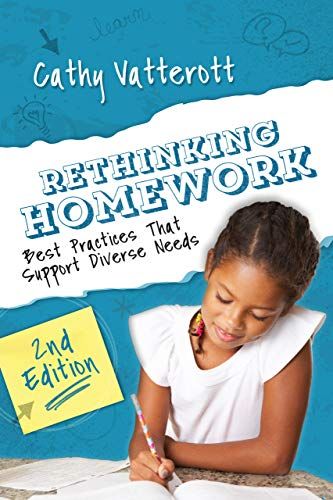

ASCD Rethinking Homework
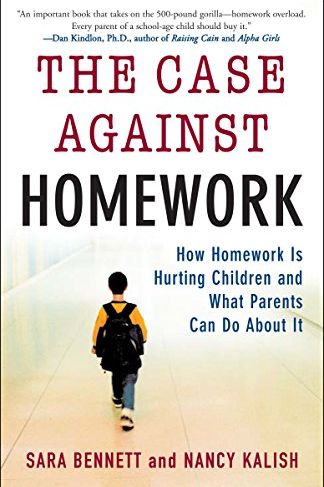
Harmony The Case Against Homework
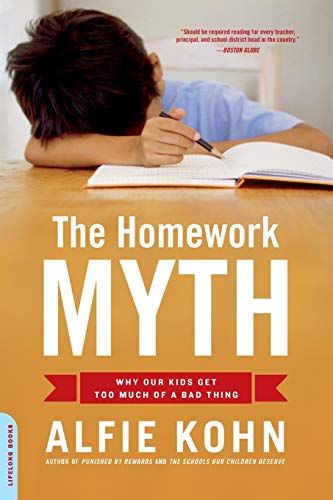
Da Capo Press The Homework Myth
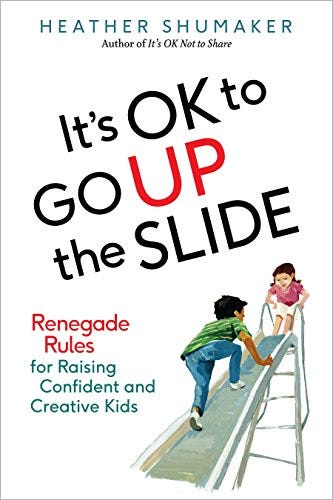
TarcherPerigee It's OK to Go Up the Slide
For can't-miss news, expert beauty advice, genius home solutions, delicious recipes, and lots more, sign up for the Good Housekeeping newsletter .
Subscribe Now

@media(max-width: 64rem){.css-o9j0dn:before{margin-bottom:0.5rem;margin-right:0.625rem;color:#ffffff;width:1.25rem;bottom:-0.2rem;height:1.25rem;content:'_';display:inline-block;position:relative;line-height:1;background-repeat:no-repeat;}.loaded .css-o9j0dn:before{background-image:url(/_assets/design-tokens/goodhousekeeping/static/images/Clover.5c7a1a0.svg);}}@media(min-width: 48rem){.loaded .css-o9j0dn:before{background-image:url(/_assets/design-tokens/goodhousekeeping/static/images/Clover.5c7a1a0.svg);}} Back-to-School Season 2023

Easy Ideas to Celebrate 100 Days of School

40 Dorm Room Essentials for College Students

40 Fun Back-to-School Activities for Kids

Pilot FriXion Pens Are Every Parent’s Bestie

Shop This Epic Amazon Back-to-School Sale of 2023
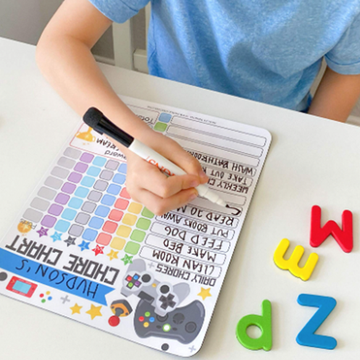
48 Easy Back-to-School Organization Ideas
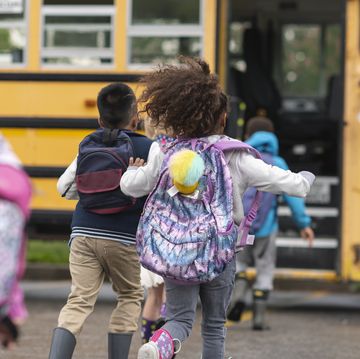
50 Back-to-School Quotes

12 Best Kids Backpacks for School 2024

Amazon Shoppers Love These Reusable Storage Bags

The Ultimate Back-to-School Supplies List
Are You Down With or Done With Homework?
- Posted January 17, 2012
- By Lory Hough

The debate over how much schoolwork students should be doing at home has flared again, with one side saying it's too much, the other side saying in our competitive world, it's just not enough.
It was a move that doesn't happen very often in American public schools: The principal got rid of homework.
This past September, Stephanie Brant, principal of Gaithersburg Elementary School in Gaithersburg, Md., decided that instead of teachers sending kids home with math worksheets and spelling flash cards, students would instead go home and read. Every day for 30 minutes, more if they had time or the inclination, with parents or on their own.
"I knew this would be a big shift for my community," she says. But she also strongly believed it was a necessary one. Twenty-first-century learners, especially those in elementary school, need to think critically and understand their own learning — not spend night after night doing rote homework drills.
Brant's move may not be common, but she isn't alone in her questioning. The value of doing schoolwork at home has gone in and out of fashion in the United States among educators, policymakers, the media, and, more recently, parents. As far back as the late 1800s, with the rise of the Progressive Era, doctors such as Joseph Mayer Rice began pushing for a limit on what he called "mechanical homework," saying it caused childhood nervous conditions and eyestrain. Around that time, the then-influential Ladies Home Journal began publishing a series of anti-homework articles, stating that five hours of brain work a day was "the most we should ask of our children," and that homework was an intrusion on family life. In response, states like California passed laws abolishing homework for students under a certain age.
But, as is often the case with education, the tide eventually turned. After the Russians launched the Sputnik satellite in 1957, a space race emerged, and, writes Brian Gill in the journal Theory Into Practice, "The homework problem was reconceived as part of a national crisis; the U.S. was losing the Cold War because Russian children were smarter." Many earlier laws limiting homework were abolished, and the longterm trend toward less homework came to an end.
The debate re-emerged a decade later when parents of the late '60s and '70s argued that children should be free to play and explore — similar anti-homework wellness arguments echoed nearly a century earlier. By the early-1980s, however, the pendulum swung again with the publication of A Nation at Risk , which blamed poor education for a "rising tide of mediocrity." Students needed to work harder, the report said, and one way to do this was more homework.
For the most part, this pro-homework sentiment is still going strong today, in part because of mandatory testing and continued economic concerns about the nation's competitiveness. Many believe that today's students are falling behind their peers in places like Korea and Finland and are paying more attention to Angry Birds than to ancient Babylonia.
But there are also a growing number of Stephanie Brants out there, educators and parents who believe that students are stressed and missing out on valuable family time. Students, they say, particularly younger students who have seen a rise in the amount of take-home work and already put in a six- to nine-hour "work" day, need less, not more homework.
Who is right? Are students not working hard enough or is homework not working for them? Here's where the story gets a little tricky: It depends on whom you ask and what research you're looking at. As Cathy Vatterott, the author of Rethinking Homework , points out, "Homework has generated enough research so that a study can be found to support almost any position, as long as conflicting studies are ignored." Alfie Kohn, author of The Homework Myth and a strong believer in eliminating all homework, writes that, "The fact that there isn't anything close to unanimity among experts belies the widespread assumption that homework helps." At best, he says, homework shows only an association, not a causal relationship, with academic achievement. In other words, it's hard to tease out how homework is really affecting test scores and grades. Did one teacher give better homework than another? Was one teacher more effective in the classroom? Do certain students test better or just try harder?
"It is difficult to separate where the effect of classroom teaching ends," Vatterott writes, "and the effect of homework begins."
Putting research aside, however, much of the current debate over homework is focused less on how homework affects academic achievement and more on time. Parents in particular have been saying that the amount of time children spend in school, especially with afterschool programs, combined with the amount of homework given — as early as kindergarten — is leaving students with little time to run around, eat dinner with their families, or even get enough sleep.
Certainly, for some parents, homework is a way to stay connected to their children's learning. But for others, homework creates a tug-of-war between parents and children, says Liz Goodenough, M.A.T.'71, creator of a documentary called Where Do the Children Play?
"Ideally homework should be about taking something home, spending a few curious and interesting moments in which children might engage with parents, and then getting that project back to school — an organizational triumph," she says. "A nag-free activity could engage family time: Ask a parent about his or her own childhood. Interview siblings."

Instead, as the authors of The Case Against Homework write, "Homework overload is turning many of us into the types of parents we never wanted to be: nags, bribers, and taskmasters."
Leslie Butchko saw it happen a few years ago when her son started sixth grade in the Santa Monica-Malibu (Calif.) United School District. She remembers him getting two to four hours of homework a night, plus weekend and vacation projects. He was overwhelmed and struggled to finish assignments, especially on nights when he also had an extracurricular activity.
"Ultimately, we felt compelled to have Bobby quit karate — he's a black belt — to allow more time for homework," she says. And then, with all of their attention focused on Bobby's homework, she and her husband started sending their youngest to his room so that Bobby could focus. "One day, my younger son gave us 15-minute coupons as a present for us to use to send him to play in the back room. … It was then that we realized there had to be something wrong with the amount of homework we were facing."
Butchko joined forces with another mother who was having similar struggles and ultimately helped get the homework policy in her district changed, limiting homework on weekends and holidays, setting time guidelines for daily homework, and broadening the definition of homework to include projects and studying for tests. As she told the school board at one meeting when the policy was first being discussed, "In closing, I just want to say that I had more free time at Harvard Law School than my son has in middle school, and that is not in the best interests of our children."
One barrier that Butchko had to overcome initially was convincing many teachers and parents that more homework doesn't necessarily equal rigor.
"Most of the parents that were against the homework policy felt that students need a large quantity of homework to prepare them for the rigorous AP classes in high school and to get them into Harvard," she says.
Stephanie Conklin, Ed.M.'06, sees this at Another Course to College, the Boston pilot school where she teaches math. "When a student is not completing [his or her] homework, parents usually are frustrated by this and agree with me that homework is an important part of their child's learning," she says.
As Timothy Jarman, Ed.M.'10, a ninth-grade English teacher at Eugene Ashley High School in Wilmington, N.C., says, "Parents think it is strange when their children are not assigned a substantial amount of homework."
That's because, writes Vatterott, in her chapter, "The Cult(ure) of Homework," the concept of homework "has become so engrained in U.S. culture that the word homework is part of the common vernacular."
These days, nightly homework is a given in American schools, writes Kohn.
"Homework isn't limited to those occasions when it seems appropriate and important. Most teachers and administrators aren't saying, 'It may be useful to do this particular project at home,'" he writes. "Rather, the point of departure seems to be, 'We've decided ahead of time that children will have to do something every night (or several times a week). … This commitment to the idea of homework in the abstract is accepted by the overwhelming majority of schools — public and private, elementary and secondary."
Brant had to confront this when she cut homework at Gaithersburg Elementary.
"A lot of my parents have this idea that homework is part of life. This is what I had to do when I was young," she says, and so, too, will our kids. "So I had to shift their thinking." She did this slowly, first by asking her teachers last year to really think about what they were sending home. And this year, in addition to forming a parent advisory group around the issue, she also holds events to answer questions.
Still, not everyone is convinced that homework as a given is a bad thing. "Any pursuit of excellence, be it in sports, the arts, or academics, requires hard work. That our culture finds it okay for kids to spend hours a day in a sport but not equal time on academics is part of the problem," wrote one pro-homework parent on the blog for the documentary Race to Nowhere , which looks at the stress American students are under. "Homework has always been an issue for parents and children. It is now and it was 20 years ago. I think when people decide to have children that it is their responsibility to educate them," wrote another.
And part of educating them, some believe, is helping them develop skills they will eventually need in adulthood. "Homework can help students develop study skills that will be of value even after they leave school," reads a publication on the U.S. Department of Education website called Homework Tips for Parents. "It can teach them that learning takes place anywhere, not just in the classroom. … It can foster positive character traits such as independence and responsibility. Homework can teach children how to manage time."
Annie Brown, Ed.M.'01, feels this is particularly critical at less affluent schools like the ones she has worked at in Boston, Cambridge, Mass., and Los Angeles as a literacy coach.
"It feels important that my students do homework because they will ultimately be competing for college placement and jobs with students who have done homework and have developed a work ethic," she says. "Also it will get them ready for independently taking responsibility for their learning, which will need to happen for them to go to college."
The problem with this thinking, writes Vatterott, is that homework becomes a way to practice being a worker.
"Which begs the question," she writes. "Is our job as educators to produce learners or workers?"
Slate magazine editor Emily Bazelon, in a piece about homework, says this makes no sense for younger kids.
"Why should we think that practicing homework in first grade will make you better at doing it in middle school?" she writes. "Doesn't the opposite seem equally plausible: that it's counterproductive to ask children to sit down and work at night before they're developmentally ready because you'll just make them tired and cross?"
Kohn writes in the American School Board Journal that this "premature exposure" to practices like homework (and sit-and-listen lessons and tests) "are clearly a bad match for younger children and of questionable value at any age." He calls it BGUTI: Better Get Used to It. "The logic here is that we have to prepare you for the bad things that are going to be done to you later … by doing them to you now."
According to a recent University of Michigan study, daily homework for six- to eight-year-olds increased on average from about 8 minutes in 1981 to 22 minutes in 2003. A review of research by Duke University Professor Harris Cooper found that for elementary school students, "the average correlation between time spent on homework and achievement … hovered around zero."
So should homework be eliminated? Of course not, say many Ed School graduates who are teaching. Not only would students not have time for essays and long projects, but also teachers would not be able to get all students to grade level or to cover critical material, says Brett Pangburn, Ed.M.'06, a sixth-grade English teacher at Excel Academy Charter School in Boston. Still, he says, homework has to be relevant.
"Kids need to practice the skills being taught in class, especially where, like the kids I teach at Excel, they are behind and need to catch up," he says. "Our results at Excel have demonstrated that kids can catch up and view themselves as in control of their academic futures, but this requires hard work, and homework is a part of it."
Ed School Professor Howard Gardner basically agrees.
"America and Americans lurch between too little homework in many of our schools to an excess of homework in our most competitive environments — Li'l Abner vs. Tiger Mother," he says. "Neither approach makes sense. Homework should build on what happens in class, consolidating skills and helping students to answer new questions."
So how can schools come to a happy medium, a way that allows teachers to cover everything they need while not overwhelming students? Conklin says she often gives online math assignments that act as labs and students have two or three days to complete them, including some in-class time. Students at Pangburn's school have a 50-minute silent period during regular school hours where homework can be started, and where teachers pull individual or small groups of students aside for tutoring, often on that night's homework. Afterschool homework clubs can help.
Some schools and districts have adapted time limits rather than nix homework completely, with the 10-minute per grade rule being the standard — 10 minutes a night for first-graders, 30 minutes for third-graders, and so on. (This remedy, however, is often met with mixed results since not all students work at the same pace.) Other schools offer an extended day that allows teachers to cover more material in school, in turn requiring fewer take-home assignments. And for others, like Stephanie Brant's elementary school in Maryland, more reading with a few targeted project assignments has been the answer.
"The routine of reading is so much more important than the routine of homework," she says. "Let's have kids reflect. You can still have the routine and you can still have your workspace, but now it's for reading. I often say to parents, if we can put a man on the moon, we can put a man or woman on Mars and that person is now a second-grader. We don't know what skills that person will need. At the end of the day, we have to feel confident that we're giving them something they can use on Mars."
Read a January 2014 update.
Homework Policy Still Going Strong

Ed. Magazine
The magazine of the Harvard Graduate School of Education
Related Articles

Commencement Marshal Sarah Fiarman: The Principal of the Matter

Making Math “Almost Fun”
Alum develops curriculum to entice reluctant math learners

Reshaping Teacher Licensure: Lessons from the Pandemic
Olivia Chi, Ed.M.'17, Ph.D.'20, discusses the ongoing efforts to ensure the quality and stability of the teaching workforce
Is Homework Good or Bad for Students?
It's mostly good, especially for the sciences, but it also can be bad
JGI / Jamie Grill / Getty Images
- Homework Tips
- Learning Styles & Skills
- Study Methods
- Time Management
- Private School
- College Admissions
- College Life
- Graduate School
- Business School
- Distance Learning
- Ph.D., Biomedical Sciences, University of Tennessee at Knoxville
- B.A., Physics and Mathematics, Hastings College
Homework isn't fun for students to do or for teachers to grade, so why do it? Here are some reasons why homework is good and why it's bad.
Why Homework Is Good
Here are 10 reasons why homework is good, especially for the sciences, such as chemistry:
- Doing homework teaches you how to learn on your own and work independently. You'll learn how to use resources such as texts, libraries, and the internet. No matter how well you thought you understood the material in class, there will be times when you'll get stuck doing homework. When you face the challenge, you learn how to get help, how to deal with frustration, and how to persevere.
- Homework helps you learn beyond the scope of the class. Example problems from teachers and textbooks show you how to do an assignment. The acid test is seeing whether you truly understand the material and can do the work on your own. In science classes, homework problems are critically important. You see concepts in a whole new light, so you'll know how equations work in general, not just how they work for a particular example. In chemistry, physics, and math, homework is truly important and not just busywork.
- It shows you what the teacher thinks is important to learn, so you'll have a better idea of what to expect on a quiz or test .
- It's often a significant part of your grade . If you don't do it, it could cost you , no matter how well you do on exams.
- Homework is a good opportunity to connect parents, classmates, and siblings with your education. The better your support network, the more likely you are to succeed in class.
- Homework, however tedious it might be, teaches responsibility and accountability. For some classes, homework is an essential part of learning the subject matter.
- Homework nips procrastination in the bud. One reason teachers give homework and attach a big part of your grade to it is to motivate you to keep up. If you fall behind, you could fail.
- How will you get all your work done before class? Homework teaches you time management and how to prioritize tasks.
- Homework reinforces the concepts taught in class. The more you work with them, the more likely you are to learn them.
- Homework can help boost self-esteem . Or, if it's not going well, it helps you identify problems before they get out of control.
Sometimes Homework Is Bad
So, homework is good because it can boost your grades , help you learn the material, and prepare you for tests. It's not always beneficial, however. Sometimes homework hurts more than it helps. Here are five ways homework can be bad:
- You need a break from a subject so you don't burn out or lose interest. Taking a break helps you learn.
- Too much homework can lead to copying and cheating.
- Homework that is pointless busywork can lead to a negative impression of a subject (not to mention a teacher).
- It takes time away from families, friends, jobs, and other ways to spend your time.
- Homework can hurt your grades. It forces you to make time management decisions, sometimes putting you in a no-win situation. Do you take the time to do the homework or spend it studying concepts or doing work for another subject? If you don't have the time for the homework, you could hurt your grades even if you ace the tests and understand the subject.
- Free French Worksheets
- How are College Academics Different from High School?
- Organic Chemistry Survival Tips
- 5 Top Reasons Why Students Fail Chemistry
- What to Do if You Are Failing Chemistry
- Should You Take a GRE Review Course?
- Study Habits That Can Improve Grades and Performance
- 10 Ways to Impress a Teacher
- How to Get Your Homework Done in College
- Topics for a Lesson Plan Template
- The Case for the Importance of Taking Notes
- How to Change Your Habits and Improve Your Grades
- Essential Strategies to Help You Become an Outstanding Student
- Study Tips for Math Homework and Math Tests
- 4 Tips for Completing Your Homework On Time
- 20 Tips for Success in High School

An Age-By-Age Guide to Helping Kids Manage Homework
D o you ever wonder whether homework is gauging the child’s ability to complete assignments or the parent’s? On one end of the spectrum, a parent might never mention homework and assume it gets done independently; on the other end are the parents who micromanage to be sure every worksheet is absolutely perfect.
Being too laissez faire about homework might deny a child the support they need to develop executive functioning skills, but being too involved could stifle their independence. So how much parent participation in homework is actually appropriate throughout a child’s education?
Basic homework tips
According to Scholastic , you should follow these rules of thumb to support your child during homework (without going overboard):
- Stay nearby and available for questions without getting right in the middle of homework.
- Avoid the urge to correct mistakes unless your child asks for help.
- Instead of nagging, set up a homework routine with a dedicated time and place.
- Teach time management for a larger project by helping them break it into chunks.
Child psychologist Dr. Emily W. King recently wrote about rethinking homework in her newsletter. King explains at what ages kids are typically able to do homework independently, but she writes that each child’s ability to concentrate at the end of the day and use executive functioning skills for completing tasks is very individual. I talked to her for more information on how much parental involvement in homework completion is needed, according to a child’s age and grade level.
Kindergarten to second grade
Whether children even need homework this early is a hot debate. Little ones are still developing fine motor skills and their ability to sit still and pay attention at this age.
“If a child is given homework before their brain and body are able to sit and focus independently, then we are relying on the parent or other caregivers to sit with the child to help them focus,” King said. “Think about when the child is able to sit and focus on non-academic tasks like dinner, art, or music lessons. This will help you tease out executive functioning skills from academic understanding.”
Elementary-age children need time for unstructured play and structured play like music, arts, and sports. They need outside time, free time, and quiet time, King said. For children who are not ready for independent work, nightly reading with another family member is enough “homework,” she said.
Third to fifth grades
Many children will be able to do homework independently in grades 3-5. Even then, their ability to focus and follow through may vary from day to day.
“Most children are ready for practicing independent work between third and fifth grade, but maybe not yet in the after-school hours when they are tired and want to rest or play. We need to begin exposing children to organization and structure independently in late elementary school to prepare them for more independence in middle school,” King said.
Neurodivergent kids may need more parental support for several years before they work independently.
“Neurodivergent children, many of whom have executive functioning weaknesses, are not ready to work independently in elementary school. Children without executive functioning weaknesses (e.g., the ability to remain seated and attend to a task independently) are able to do this somewhere between third and fifth grade, but it’s very possible they can work independently at school but be too tired to do it later in the afternoon,” King said. “We need to follow the child’s skills and give them practice to work independently when they seem ready. Of course, if a child wants to do extra work after school due to an interest, go for it.”
For students who are not ready to work independently in middle school, it is better to reduce the amount of homework they are expected to complete so they can practice independence and feel successful.
Middle school
In sixth grade and later, kids are really developing executive functioning skills like planning, organizing, paying attention, initiating, shifting focus, and execution. They will still need your encouragement to keep track of assignments, plan their time, and stick to a homework routine.
“Middle school students need lots of organization support and putting systems in place to help them keep track of assignments, due dates, and materials,” King said.
High school
By this point, congratulations: You can probably be pretty hands-off with homework. Remain open and available if your teen needs help negotiating a problem, but executing plans should be up to them now.
“In high school, parents are working to put themselves out of a job and begin stepping back as children take the lead on homework. Parents of high schoolers are ‘homework consultants,’” King said. “We are there to help solve problems, talk through what to say in an email to a teacher, but we are not writing the emails or talking to the teachers for our kids.”
What if homework is not working for them (or you)
There are a number of reasons a child might not be managing homework at the same level as their peers, including academic anxiety and learning disabilities.
If your child is showing emotional distress at homework time, it might be a sign that they have run out of gas from the structure, socialization, and stimulation they have already been through at school that day. One way to support kids is to teach them how to have a healthy balance of work and play time.
“When we ask students to keep working after school when their tank is on empty, we likely damage their love of learning and fill them with dread for tomorrow,” King wrote in her newsletter.
King said in her experience as a child psychologist, the amount of homework support a child needs is determined by their individual abilities and skills more than their age or grade level.
“All of these steps vary for a neurodivergent child and we are not following these guidelines by age or grade but rather by their level of skills development to become more independent,” she said. “In order to independently complete homework, a child must be able to have attended to the directions in class, brought the materials home, remember to get the materials out at home, remember to begin the task, understand the task, remain seated and attention long enough to complete the task, be able to complete the task, return the work to their backpack, and return the work to the teacher. If any of these skills are weak or the child is not able to do these independently, there will be a breakdown in the system of homework. You can see why young students and neurodivergent students would struggle with this process.”
If you and your child have trouble meeting homework expectations, talk to their teacher about what could be contributing to the problem and how to modify expectations for them.
“Get curious about your child’s skill level at that time of day,” King said. “Are they able to work independently at school but not at home? Are they not able to work independently any time of day? Are they struggling with this concept at school, too? When are they successful?”
Sign up for Lifehacker's Newsletter. For the latest news, Facebook , Twitter and Instagram .
Click here to read the full article.

School refusal and the Australian families gripped by blame, shame, and the fear of a lost education
A growing crisis of school refusal is gripping Australia, leaving families in a hidden struggle.
When it first started happening, Alice would drag her daughter Frieda into kindergarten screaming.
The school staff would restrain the five-year-old as they locked the door.
"If tough love worked, my child would be at school. The things we put her through … I'm ashamed of it," Alice says.
She knows what other parents judge her for — being a mother who can't get her child to school.
"It's a really lonely and confusing and shameful world because you assume that you are the problem," the Sydney mum says.
"You see other families, their kids just happily going to school … and you feel like you're just in this complete other world."
Frieda, now eight, is one of the thousands of children in Australia experiencing 'school refusal', also known as 'school can't' — children who have difficulty attending school due to emotional distress.
Some days Frieda lasts to the 3pm bell, others she might only make it to the school gate or not leave home at all.
"I get a bit upset when I usually don't make it to school. 'Cause I really want to, but somehow I don't know how to get there," Frieda says.
For parents, it's a living nightmare that can result in broken careers, fear of kids missing out and threats of fines and prosecution.
For the education system, it raises fundamental questions about whether schools can actually include every child.
Distress and disengagement
An increasing number of Australian children are struggling to get to school.
In 2023, the attendance rate for students in Years 1 to 10 was 88 per cent, down from 92 per cent almost a decade earlier.
Last year, 38 per cent of all students in Years 1 to 10 were absent for more than 20 days a year – which is considered chronically absent.
Dr Lisa McKay-Brown, an education researcher at the University of Melbourne, says because there is no national data tracking the reason for absences, it's unclear what is driving disengagement.
"How many of this is medical, how many of this is school refusal, how many of this is kids on holidays? That's where the problem lies because it's really hard to resource and plan and intervene when you don't know how big the problem is," Dr McKay-Brown says.
Many parents and experts argue the more accurate term is 'school can't' — it's not that the child won't go to school, they can't.
Experts say the emotional distress can be caused by problems at home or school but is often associated with neurodiversity and mental health disorders.
"We know that there are certain groups that are more at risk than others … they may be autistic, they may have learning difficulties, ADHD. They may have anxiety or some other mood disorder," Dr McKay-Brown says.
'Ethan was left behind'
When Ethan looks at a photo of himself in grade 3, he knows behind the smile was someone without much hope.
"I felt like I wouldn't actually get a job when I get older. I would be homeless, sleeping on the side of the road," the 12-year-old says.
By grade 3 in his Geelong primary school, Ethan couldn't read or write.
He'd been falling behind for years, and becoming more disengaged.
"I couldn't even spell my name," Ethan says.
When Ethan's mum Sam saw how he was treated in class one day, it left her heartbroken.
"Instead of sitting there and writing a sentence like the other children were doing, they just said 'Oh, just draw a picture'. It pushed him further away," she says.
Pandemic lockdowns only made matters worse.
Ethan found online learning hard and later, found the return to school challenging. As he struggled to keep up, he began having physical outbursts and experiencing bullying. Eventually he started threatening self-harm if he was forced to attend school.
"It wasn't safe for me. I got bullied every day. Made me feel ... like I was locked up in a cage,” Ethan says.
Sam, who had recently separated with four kids, was struggling to balance working to pay off her mortgage with Ethan's low attendance rate.
"Being a parent is really hard. Especially when they're having to finish school early, or you're getting phone calls saying, 'You need to come pick your child up, they've broken a window, or they've tried to self-harm'."
"You kind of can't commit to anything. Your life just goes on hold."
When Ethan's public school said they were out of options to help him, Sam added her son's name to a 100-person long waitlist for an independent school that helps youth who are disengaged from mainstream schooling.
The months slipped by as they waited for a spot.
"No child left behind is definitely not a reality, because Ethan was left behind," Sam says.
The shadow of the law
Because school attendance is required by law, for parents of kids struggling to go, the threat of legal action always looms.
When Kurt's 16-year-old daughter Hayley couldn't get out of bed to go to school, the daily texts started coming.
"Your daughter was marked absent … this absence has been recorded as unexplained or unjustified," one text from her Sydney school read.
Hayley says school staff eventually told her that her absences could result in a $11,000 fine, placing further pressure on the family.
“I had my parents coming in, like yelling at me … I got the light turned on, the blinds opened, the bed sheets pulled off, stuff like that,” Hayley says.
During a fight with Hayley, it dawned on Kurt, who is a mental health nurse, that his daughter had depression. He'd also noticed cuts on her arms.
"The school stuff was hard, but the stuff where you cry yourself to sleep sometimes is having a child doing that themselves … and working in the industry knowing what the outcomes can be," Kurt says tearily.
Meanwhile, the texts continued, leaving Kurt fearing what might come next.
In a general statement provided to Four Corners, the NSW Department of Education said, "where attendance improvement support has been unsuccessful … and the parents have not meaningfully engaged, the matter may be referred for consideration of legal action".
Homeschooling Hayley would have stopped the texts, but for the working single-dad of two, it wasn't an option. Eventually, school staff assured him he would not be fined.
"We started talking to the deputy principal and she was excellent, so she put a plan in place with Hayley," Kurt says.
The number of homeschooled children has doubled during the past five years, from 21,456 pupils in 2019 to more than 43,797 in 2023.
Alice has seen parents post on Facebook about giving up their careers to homeschool their kids. It's an option she's thought about a lot for Frieda who has been diagnosed with autism.
"The prospect of homeschooling Frieda hangs over me every day … but I can't afford to," Alice says.
When Frieda doesn't make it into school, Alice isn't able to get through a normal work day. To make up for lost time she works into the night or over weekends.
Frieda's attendance has improved after moving to a school where staff have been more accommodating to her needs.
Despite the improvement, Alice received a formal warning letter last month regarding Frieda's attendance. A second will trigger contact from a homeschool liaison officer.
"The principal did explain it's just how the system works, and it doesn't need to be a scary thing as they may have more resources … but if I didn't have the heads up, I would have been terrified," Alice says.
"When you get something like that … it's got a shaming tone. Like you're failing at this, you're failing because your child isn't going to school all the time."
Alice feels like that sentiment runs across the department's pamphlets on school refusal, particularly the NSW Education slogan "Every School Day Counts".
"How insulting. Of course we want our kids to be going every day."
"They were putting [it] back onto the parents, it's our fault … instead of 'school attendance is tanking, so is numeracy and literacy' and the department isn't prepared to go, 'Maybe it's a problem with the system'."
'You have to go through so much trauma’
After a six month wait, Ethan got a place at MacKillop Education in Geelong, a non-government school that helps students disengaged from mainstream schooling to get back on track.
Teachers and the principal personally greeted the shy newcomer at the school gates every day.
With just 80 students and class sizes capped at eight, Ethan got the attention he needed to work on things like regulating his emotions when he felt challenged by the schoolwork.
"He would bite or pull his hair and he would say, 'I'm so dumb'. That's the thing that upset him most, that he thought he was stupid," says Sharyn Sadler, Ethan's support teacher.
"There was a fear of failure. And that's actually common amongst many of our children because they've experienced so much failure."
To support students' emotional regulation, classrooms are fitted with chill-out sensory spaces and teachers keep a predictable routine. Uniforms are also scrapped for students who find them itchy.
"I think there does need to be greater flexibility in the system in how we're providing education for young people to be able to access it. And that comes through knowledge, human resourcing, money," MacKillop co-principal Skye Staude says.
For most MacKillop students, the school is a transition period to get them back into a mainstream setting.
After two years at the school, Ethan's attendance went up to full-time. He can now read fluently and spell.
This year he transitioned into a mainstream government school with additional supports.
Sam knows not every child gets the opportunity Ethan does.
"Alternative schools like this, they're not as easily accessible for kids who need them. You have to go through so much trauma, so much anger. The child has to go through so much themselves to even be put in the position to access a school like this," Sam says.
"Ethan's been given that chance, and he's really grown with it."
Ethan will be a teenager next year, and he likes the person he's finally becoming.
"I feel like I got hope in myself. I'm proud of myself," Ethan says.
Sam knows that school refusal is difficult to comprehend for those that haven't lived it themselves, but knows from experience how debilitating it can be.
"You feel like there's no light at the end of the tunnel as a parent, so you're not thinking about your hopes, what you want out of your life," Sam says.
For some kids, the path ahead isn't as straightforward.
Hayley's attendance improved to 85 per cent last year when she signed up to a pilot program run by NSW Education for students with chronic attendance issues that employs interest-based learning.
But this year she's had setbacks — first with her mental health, then the program made some changes to its approach.
"Sometimes I'll be going great for a few weeks or months or even a whole year, but then stuff will not be going as great again, and then my attendance will go down again."
To stay engaged, the program has allowed Hayley to make adjustments like wearing headphones to block out distractions. She's also started attending a local school for art class four days a week.
She's noticed the change in herself.
"I'm actually doing things. Talking to people instead of staying in my room, trying to get to school."
"I want to be able to get through year 11 and 12 and get into uni to study psychology. So I've been doing as much as I can to get there."
One size doesn't fit all
The issue of school refusal, which exists largely in the shadows, was pushed into the spotlight last year by a Senate inquiry.
Greens Senator Penny Allman-Payne, who helped instigate the inquiry, says Australia's one-size-fits-all education system is outdated.
"This is the model of education that we had over 100 years ago. The world is very different now. Young people are very different now," she says.
"The good news is that we know that there are things that work: early intervention, smaller class sizes, flexible campuses, interest-led learning."
The federal government has agreed or supported in-principle two of the inquiry's 14 recommendations.
They include commissioning the Australian Education Research Organisation to analyse the drivers of school refusal and possible interventions, and disseminate school refusal training for teachers.
Alice feels like the government has stopped short of investing in schools properly. She's worried asking more of existing teachers will strain the system.
"The teachers are under so much pressure. So, they're going to do more training, more to their workload when they're already stretched?"
Frieda's attendance is now at 54 per cent, she also successfully sat her year 3 NAPLAN test.
But Alice knows there's no guarantee things will keep improving.
"I don't know what our lives are going to look like next week, next month, next year," says Alice.
The fear of the unknown scares her – if Frieda will get through the school day, if she'll get another warning letter.
"As a parent, that's pretty awful because all you want is for your kid to be happy."
Watch Four Corners: The kids who can't, tonight from 8.30pm on ABC TV and ABC iview .
Subscribe to the Four Corners newsletter and follow Four Corners on Facebook .
Do you know more about this story? Contact Four Corners here .
Story: Mridula Amin and Sascha Ettinger-Epstein
Photography: Mridula Amin
Digital Production: Mridula Amin and Nick Wiggins
- X (formerly Twitter)
- Access To Education
- Online and Remote Learning
- Primary Schools
- Secondary Schools
- Grades 6-12
- School Leaders
Free end-of-year letter templates to your students 📝!
72 Easy Science Experiments Using Materials You Already Have On Hand
Because science doesn’t have to be complicated.

If there is one thing that is guaranteed to get your students excited, it’s a good science experiment! While some experiments require expensive lab equipment or dangerous chemicals, there are plenty of cool projects you can do with regular household items. We’ve rounded up a big collection of easy science experiments that anybody can try, and kids are going to love them!
Easy Chemistry Science Experiments
Easy physics science experiments, easy biology and environmental science experiments, easy engineering experiments and stem challenges.

1. Taste the Rainbow
Teach your students about diffusion while creating a beautiful and tasty rainbow! Tip: Have extra Skittles on hand so your class can eat a few!
Learn more: Skittles Diffusion

2. Crystallize sweet treats
Crystal science experiments teach kids about supersaturated solutions. This one is easy to do at home, and the results are absolutely delicious!
Learn more: Candy Crystals
3. Make a volcano erupt
This classic experiment demonstrates a chemical reaction between baking soda (sodium bicarbonate) and vinegar (acetic acid), which produces carbon dioxide gas, water, and sodium acetate.
Learn more: Best Volcano Experiments
4. Make elephant toothpaste
This fun project uses yeast and a hydrogen peroxide solution to create overflowing “elephant toothpaste.” Tip: Add an extra fun layer by having kids create toothpaste wrappers for plastic bottles.

5. Blow the biggest bubbles you can
Add a few simple ingredients to dish soap solution to create the largest bubbles you’ve ever seen! Kids learn about surface tension as they engineer these bubble-blowing wands.
Learn more: Giant Soap Bubbles

6. Demonstrate the “magic” leakproof bag
All you need is a zip-top plastic bag, sharp pencils, and water to blow your kids’ minds. Once they’re suitably impressed, teach them how the “trick” works by explaining the chemistry of polymers.
Learn more: Leakproof Bag

7. Use apple slices to learn about oxidation
Have students make predictions about what will happen to apple slices when immersed in different liquids, then put those predictions to the test. Have them record their observations.
Learn more: Apple Oxidation
8. Float a marker man
Their eyes will pop out of their heads when you “levitate” a stick figure right off the table! This experiment works due to the insolubility of dry-erase marker ink in water, combined with the lighter density of the ink.
Learn more: Floating Marker Man

9. Discover density with hot and cold water
There are a lot of easy science experiments you can do with density. This one is extremely simple, involving only hot and cold water and food coloring, but the visuals make it appealing and fun.
Learn more: Layered Water

10. Layer more liquids
This density demo is a little more complicated, but the effects are spectacular. Slowly layer liquids like honey, dish soap, water, and rubbing alcohol in a glass. Kids will be amazed when the liquids float one on top of the other like magic (except it is really science).
Learn more: Layered Liquids

11. Grow a carbon sugar snake
Easy science experiments can still have impressive results! This eye-popping chemical reaction demonstration only requires simple supplies like sugar, baking soda, and sand.
Learn more: Carbon Sugar Snake
12. Mix up some slime
Tell kids you’re going to make slime at home, and watch their eyes light up! There are a variety of ways to make slime, so try a few different recipes to find the one you like best.
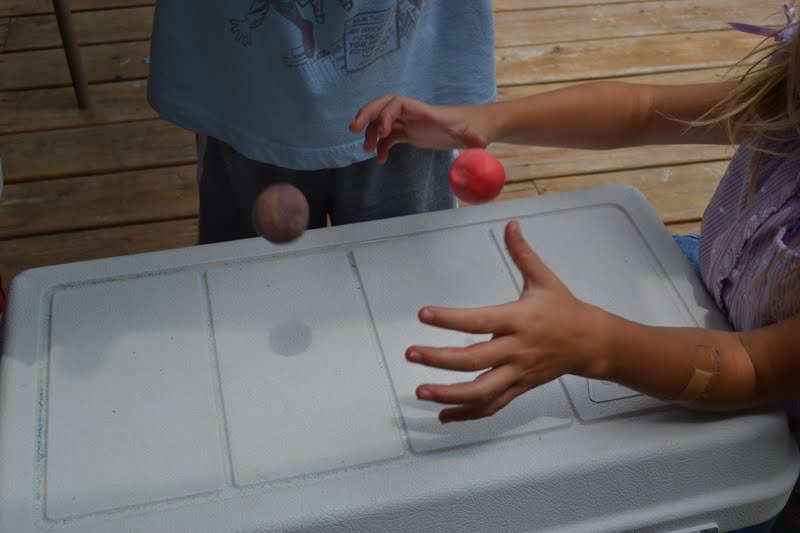
13. Make homemade bouncy balls
These homemade bouncy balls are easy to make since all you need is glue, food coloring, borax powder, cornstarch, and warm water. You’ll want to store them inside a container like a plastic egg because they will flatten out over time.
Learn more: Make Your Own Bouncy Balls

14. Create eggshell chalk
Eggshells contain calcium, the same material that makes chalk. Grind them up and mix them with flour, water, and food coloring to make your very own sidewalk chalk.
Learn more: Eggshell Chalk

15. Make naked eggs
This is so cool! Use vinegar to dissolve the calcium carbonate in an eggshell to discover the membrane underneath that holds the egg together. Then, use the “naked” egg for another easy science experiment that demonstrates osmosis .
Learn more: Naked Egg Experiment
16. Turn milk into plastic
This sounds a lot more complicated than it is, but don’t be afraid to give it a try. Use simple kitchen supplies to create plastic polymers from plain old milk. Sculpt them into cool shapes when you’re done!

17. Test pH using cabbage
Teach kids about acids and bases without needing pH test strips! Simply boil some red cabbage and use the resulting water to test various substances—acids turn red and bases turn green.
Learn more: Cabbage pH

18. Clean some old coins
Use common household items to make old oxidized coins clean and shiny again in this simple chemistry experiment. Ask kids to predict (hypothesize) which will work best, then expand the learning by doing some research to explain the results.
Learn more: Cleaning Coins

19. Pull an egg into a bottle
This classic easy science experiment never fails to delight. Use the power of air pressure to suck a hard-boiled egg into a jar, no hands required.
Learn more: Egg in a Bottle
20. Blow up a balloon (without blowing)
Chances are good you probably did easy science experiments like this when you were in school. The baking soda and vinegar balloon experiment demonstrates the reactions between acids and bases when you fill a bottle with vinegar and a balloon with baking soda.
21 Assemble a DIY lava lamp
This 1970s trend is back—as an easy science experiment! This activity combines acid-base reactions with density for a totally groovy result.

22. Explore how sugary drinks affect teeth
The calcium content of eggshells makes them a great stand-in for teeth. Use eggs to explore how soda and juice can stain teeth and wear down the enamel. Expand your learning by trying different toothpaste-and-toothbrush combinations to see how effective they are.
Learn more: Sugar and Teeth Experiment
23. Mummify a hot dog
If your kids are fascinated by the Egyptians, they’ll love learning to mummify a hot dog! No need for canopic jars , just grab some baking soda and get started.
24. Extinguish flames with carbon dioxide
This is a fiery twist on acid-base experiments. Light a candle and talk about what fire needs in order to survive. Then, create an acid-base reaction and “pour” the carbon dioxide to extinguish the flame. The CO2 gas acts like a liquid, suffocating the fire.

25. Send secret messages with invisible ink
Turn your kids into secret agents! Write messages with a paintbrush dipped in lemon juice, then hold the paper over a heat source and watch the invisible become visible as oxidation goes to work.
Learn more: Invisible Ink
26. Create dancing popcorn
This is a fun version of the classic baking soda and vinegar experiment, perfect for the younger crowd. The bubbly mixture causes popcorn to dance around in the water.

27. Shoot a soda geyser sky-high
You’ve always wondered if this really works, so it’s time to find out for yourself! Kids will marvel at the chemical reaction that sends diet soda shooting high in the air when Mentos are added.
Learn more: Soda Explosion

28. Send a teabag flying
Hot air rises, and this experiment can prove it! You’ll want to supervise kids with fire, of course. For more safety, try this one outside.
Learn more: Flying Tea Bags

29. Create magic milk
This fun and easy science experiment demonstrates principles related to surface tension, molecular interactions, and fluid dynamics.
Learn more: Magic Milk Experiment
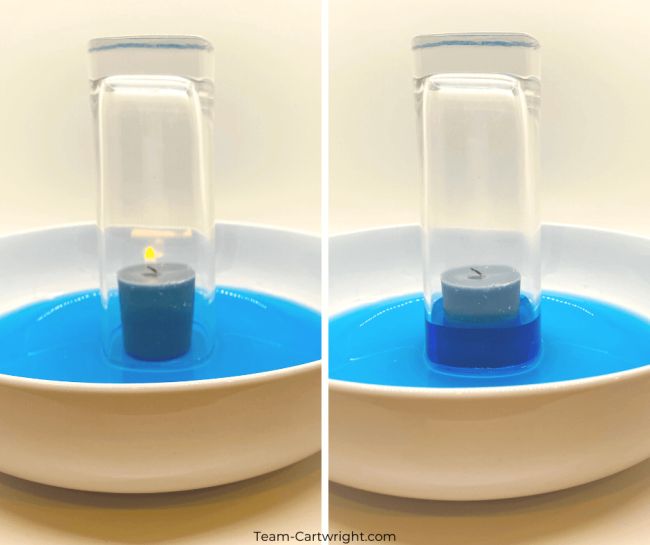
30. Watch the water rise
Learn about Charles’s Law with this simple experiment. As the candle burns, using up oxygen and heating the air in the glass, the water rises as if by magic.
Learn more: Rising Water

31. Learn about capillary action
Kids will be amazed as they watch the colored water move from glass to glass, and you’ll love the easy and inexpensive setup. Gather some water, paper towels, and food coloring to teach the scientific magic of capillary action.
Learn more: Capillary Action
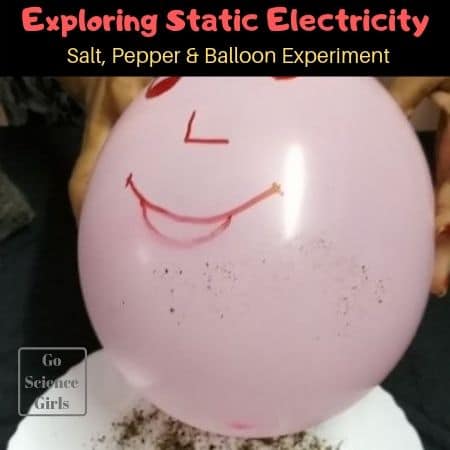
32. Give a balloon a beard
Equally educational and fun, this experiment will teach kids about static electricity using everyday materials. Kids will undoubtedly get a kick out of creating beards on their balloon person!
Learn more: Static Electricity

33. Find your way with a DIY compass
Here’s an old classic that never fails to impress. Magnetize a needle, float it on the water’s surface, and it will always point north.
Learn more: DIY Compass
34. Crush a can using air pressure
Sure, it’s easy to crush a soda can with your bare hands, but what if you could do it without touching it at all? That’s the power of air pressure!

35. Tell time using the sun
While people use clocks or even phones to tell time today, there was a time when a sundial was the best means to do that. Kids will certainly get a kick out of creating their own sundials using everyday materials like cardboard and pencils.
Learn more: Make Your Own Sundial
36. Launch a balloon rocket
Grab balloons, string, straws, and tape, and launch rockets to learn about the laws of motion.

37. Make sparks with steel wool
All you need is steel wool and a 9-volt battery to perform this science demo that’s bound to make their eyes light up! Kids learn about chain reactions, chemical changes, and more.
Learn more: Steel Wool Electricity
38. Levitate a Ping-Pong ball
Kids will get a kick out of this experiment, which is really all about Bernoulli’s principle. You only need plastic bottles, bendy straws, and Ping-Pong balls to make the science magic happen.

39. Whip up a tornado in a bottle
There are plenty of versions of this classic experiment out there, but we love this one because it sparkles! Kids learn about a vortex and what it takes to create one.
Learn more: Tornado in a Bottle

40. Monitor air pressure with a DIY barometer
This simple but effective DIY science project teaches kids about air pressure and meteorology. They’ll have fun tracking and predicting the weather with their very own barometer.
Learn more: DIY Barometer

41. Peer through an ice magnifying glass
Students will certainly get a thrill out of seeing how an everyday object like a piece of ice can be used as a magnifying glass. Be sure to use purified or distilled water since tap water will have impurities in it that will cause distortion.
Learn more: Ice Magnifying Glass

42. String up some sticky ice
Can you lift an ice cube using just a piece of string? This quick experiment teaches you how. Use a little salt to melt the ice and then refreeze the ice with the string attached.
Learn more: Sticky Ice

43. “Flip” a drawing with water
Light refraction causes some really cool effects, and there are multiple easy science experiments you can do with it. This one uses refraction to “flip” a drawing; you can also try the famous “disappearing penny” trick .
Learn more: Light Refraction With Water
44. Color some flowers
We love how simple this project is to re-create since all you’ll need are some white carnations, food coloring, glasses, and water. The end result is just so beautiful!

45. Use glitter to fight germs
Everyone knows that glitter is just like germs—it gets everywhere and is so hard to get rid of! Use that to your advantage and show kids how soap fights glitter and germs.
Learn more: Glitter Germs
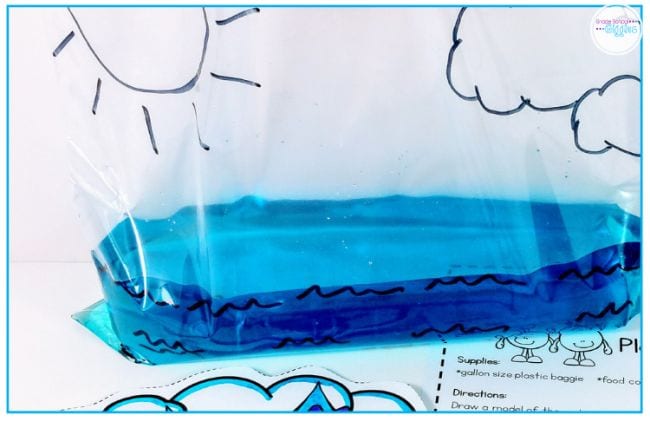
46. Re-create the water cycle in a bag
You can do so many easy science experiments with a simple zip-top bag. Fill one partway with water and set it on a sunny windowsill to see how the water evaporates up and eventually “rains” down.
Learn more: Water Cycle

47. Learn about plant transpiration
Your backyard is a terrific place for easy science experiments. Grab a plastic bag and rubber band to learn how plants get rid of excess water they don’t need, a process known as transpiration.
Learn more: Plant Transpiration
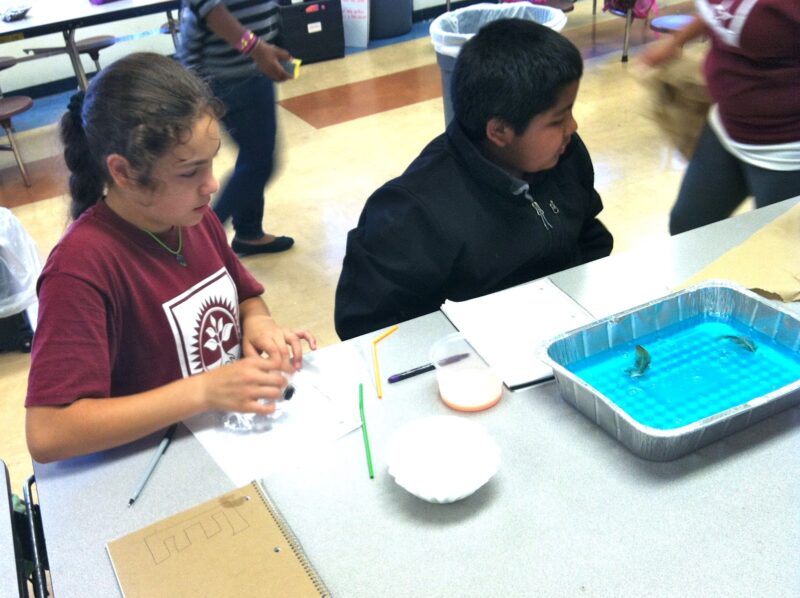
48. Clean up an oil spill
Before conducting this experiment, teach your students about engineers who solve environmental problems like oil spills. Then, have your students use provided materials to clean the oil spill from their oceans.
Learn more: Oil Spill
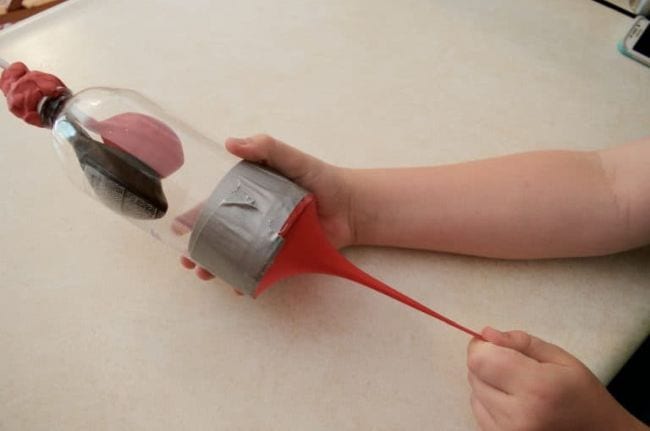
49. Construct a pair of model lungs
Kids get a better understanding of the respiratory system when they build model lungs using a plastic water bottle and some balloons. You can modify the experiment to demonstrate the effects of smoking too.
Learn more: Model Lungs

50. Experiment with limestone rocks
Kids love to collect rocks, and there are plenty of easy science experiments you can do with them. In this one, pour vinegar over a rock to see if it bubbles. If it does, you’ve found limestone!
Learn more: Limestone Experiments

51. Turn a bottle into a rain gauge
All you need is a plastic bottle, a ruler, and a permanent marker to make your own rain gauge. Monitor your measurements and see how they stack up against meteorology reports in your area.
Learn more: DIY Rain Gauge
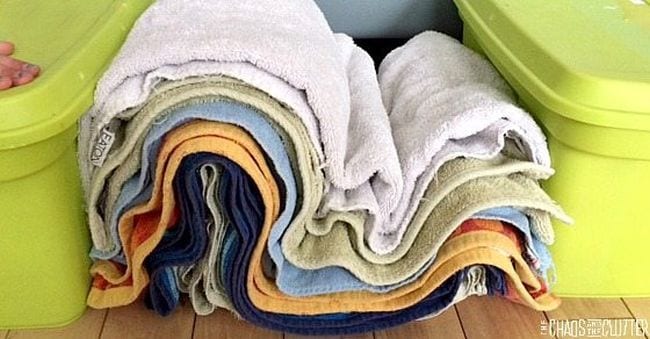
52. Build up towel mountains
This clever demonstration helps kids understand how some landforms are created. Use layers of towels to represent rock layers and boxes for continents. Then pu-u-u-sh and see what happens!
Learn more: Towel Mountains
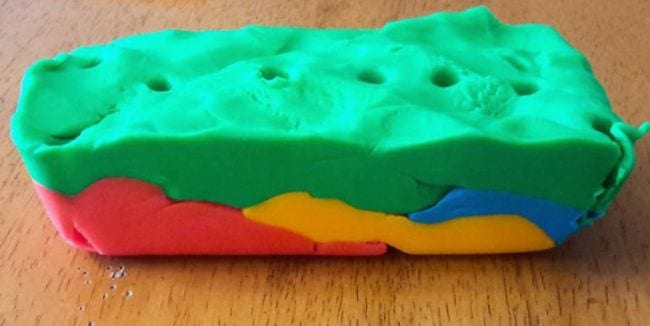
53. Take a play dough core sample
Learn about the layers of the earth by building them out of Play-Doh, then take a core sample with a straw. ( Love Play-Doh? Get more learning ideas here. )
Learn more: Play Dough Core Sampling

54. Project the stars on your ceiling
Use the video lesson in the link below to learn why stars are only visible at night. Then create a DIY star projector to explore the concept hands-on.
Learn more: DIY Star Projector

55. Make it rain
Use shaving cream and food coloring to simulate clouds and rain. This is an easy science experiment little ones will beg to do over and over.
Learn more: Shaving Cream Rain
56. Blow up your fingerprint
This is such a cool (and easy!) way to look at fingerprint patterns. Inflate a balloon a bit, use some ink to put a fingerprint on it, then blow it up big to see your fingerprint in detail.

57. Snack on a DNA model
Twizzlers, gumdrops, and a few toothpicks are all you need to make this super-fun (and yummy!) DNA model.
Learn more: Edible DNA Model
58. Dissect a flower
Take a nature walk and find a flower or two. Then bring them home and take them apart to discover all the different parts of flowers.

59. Craft smartphone speakers
No Bluetooth speaker? No problem! Put together your own from paper cups and toilet paper tubes.
Learn more: Smartphone Speakers

60. Race a balloon-powered car
Kids will be amazed when they learn they can put together this awesome racer using cardboard and bottle-cap wheels. The balloon-powered “engine” is so much fun too.
Learn more: Balloon-Powered Car

61. Build a Ferris wheel
You’ve probably ridden on a Ferris wheel, but can you build one? Stock up on wood craft sticks and find out! Play around with different designs to see which one works best.
Learn more: Craft Stick Ferris Wheel
62. Design a phone stand
There are lots of ways to craft a DIY phone stand, which makes this a perfect creative-thinking STEM challenge.
63. Conduct an egg drop
Put all their engineering skills to the test with an egg drop! Challenge kids to build a container from stuff they find around the house that will protect an egg from a long fall (this is especially fun to do from upper-story windows).
Learn more: Egg Drop Challenge Ideas
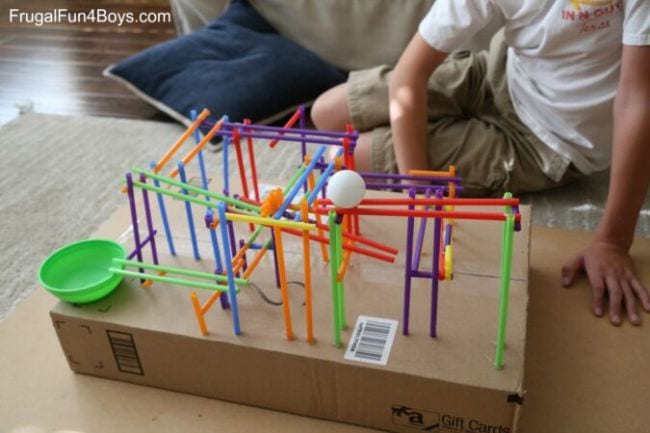
64. Engineer a drinking-straw roller coaster
STEM challenges are always a hit with kids. We love this one, which only requires basic supplies like drinking straws.
Learn more: Straw Roller Coaster

65. Build a solar oven
Explore the power of the sun when you build your own solar ovens and use them to cook some yummy treats. This experiment takes a little more time and effort, but the results are always impressive. The link below has complete instructions.
Learn more: Solar Oven

66. Build a Da Vinci bridge
There are plenty of bridge-building experiments out there, but this one is unique. It’s inspired by Leonardo da Vinci’s 500-year-old self-supporting wooden bridge. Learn how to build it at the link, and expand your learning by exploring more about Da Vinci himself.
Learn more: Da Vinci Bridge
67. Step through an index card
This is one easy science experiment that never fails to astonish. With carefully placed scissor cuts on an index card, you can make a loop large enough to fit a (small) human body through! Kids will be wowed as they learn about surface area.
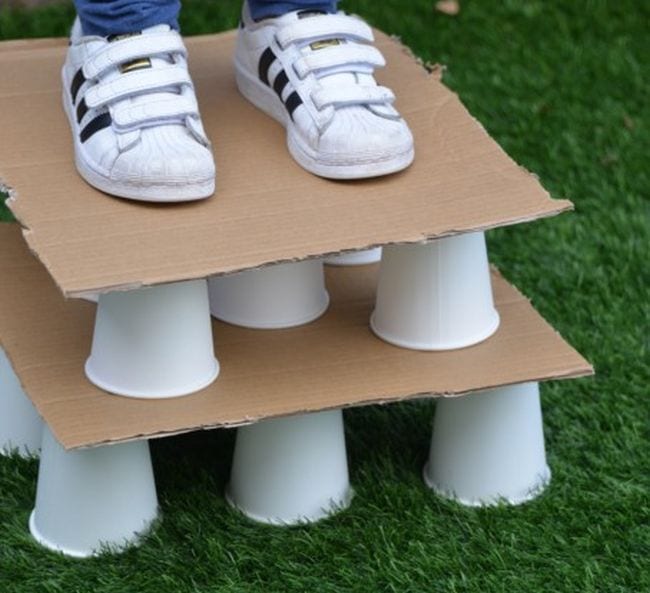
68. Stand on a pile of paper cups
Combine physics and engineering and challenge kids to create a paper cup structure that can support their weight. This is a cool project for aspiring architects.
Learn more: Paper Cup Stack

69. Test out parachutes
Gather a variety of materials (try tissues, handkerchiefs, plastic bags, etc.) and see which ones make the best parachutes. You can also find out how they’re affected by windy days or find out which ones work in the rain.
Learn more: Parachute Drop

70. Recycle newspapers into an engineering challenge
It’s amazing how a stack of newspapers can spark such creative engineering. Challenge kids to build a tower, support a book, or even build a chair using only newspaper and tape!
Learn more: Newspaper STEM Challenge

71. Use rubber bands to sound out acoustics
Explore the ways that sound waves are affected by what’s around them using a simple rubber band “guitar.” (Kids absolutely love playing with these!)
Learn more: Rubber Band Guitar
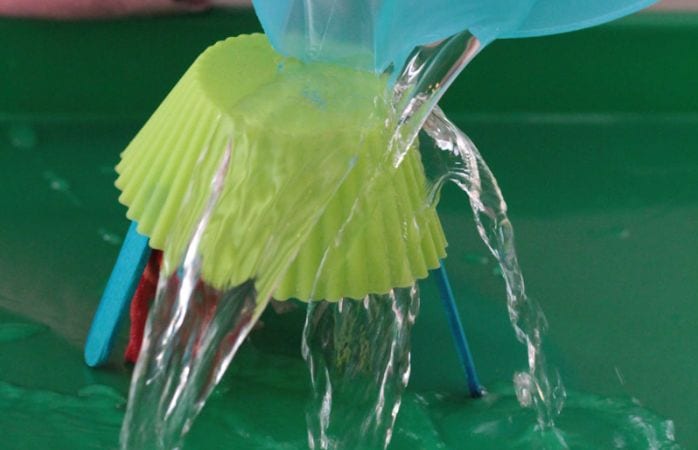
72. Assemble a better umbrella
Challenge students to engineer the best possible umbrella from various household supplies. Encourage them to plan, draw blueprints, and test their creations using the scientific method.
Learn more: Umbrella STEM Challenge
Plus, sign up for our newsletters to get all the latest learning ideas straight to your inbox.

You Might Also Like

Magic Milk Experiment: How-To Plus Free Worksheet
This classic experiment teaches kids about basic chemistry and physics. Continue Reading
Copyright © 2024. All rights reserved. 5335 Gate Parkway, Jacksonville, FL 32256

IMAGES
COMMENTS
And homework has a greater positive effect on students in secondary school (grades 7-12) than those in elementary. "Every child should be doing homework, but the amount and type that they're doing ...
It allows everyone to get to know each other better, and parents can see where their children are struggling. In the same sense, parents can also see where their children are excelling. Homework in turn can allow for a better, more targeted educational plan for the student. 5. Homework Allows For More Learning Time.
Homework may also increase parents' involvement in their children's schooling. Yet too much homework may also have some negative impacts on non-academic skills by reducing opportunities for ...
For decades, the homework standard has been a "10-minute rule," which recommends a daily maximum of 10 minutes of homework per grade level. Second graders, for example, should do about 20 ...
Homework can also help clue parents in to the existence of any learning disabilities their children may have, allowing them to get help and adjust learning strategies as needed. Duke University Professor Harris Cooper noted, "Two parents once told me they refused to believe their child had a learning disability until homework revealed it to ...
Homework deserves much of the blame. "Kids should have a chance to just be kids and do things they enjoy, particularly after spending six hours a day in school," says Alfie Kohn, author of The Homework Myth. "It's absurd to insist that children must be engaged in constructive activities right up until their heads hit the pillow."
They suggest that children should have time to play after school. This, of course is true, but many kindergarten kids are excited to have homework like their older siblings. If they give homework, most teachers of young children make assignments very short—often following an informal rule of 10 minutes per grade level. "No homework" does not ...
Too much homework may diminish its effectiveness. While research on the optimum amount of time students should spend on homework is limited, there are indications that for high school students, 1½ to 2½ hours per night is optimum. Middle school students appear to benefit from smaller amounts (less than 1 hour per night).
As young children begin school, the focus should be on cultivating a love of learning, and assigning too much homework can undermine that goal. And young students often don't have the study skills to benefit fully from homework, so it may be a poor use of time (Cooper, 1989; Cooper et al., 2006; Marzano & Pickering, 2007). A more effective ...
As many children, not to mention their parents and teachers, are drained by their daily workload, some schools and districts are rethinking how homework should work—and some teachers are doing ...
Should we get rid of homework? In ... Kids need to learn how to practice things. Homework, in many cases, is the only ritualized thing they have to do every day. Even if we could perfectly ...
Beyond that point, kids don't absorb much useful information, Cooper says. In fact, too much homework can do more harm than good. Researchers have cited drawbacks, including boredom and burnout toward academic material, less time for family and extracurricular activities, lack of sleep and increased stress.
June 26, 2022 at 12:42 am. Studies have shown that homework improved student achievement in terms of improved grades, test results, and the likelihood to attend college. Link. i think homework can help kids but at the same time not help kids. Link.
Children and adolescents have an intrinsic motivation to learn; when freed from homework, they often create their own assignments and projects out of their curiosity and interest.
While it is absolutely true that parents should not do their children's homework, there is a role for parents — one that's perhaps best described as "homework project manager." Parents can be monitoring, organizing, motivating, and praising the homework effort as it gets done. ... Have children do their work at a communal table. Stay ...
What Research Says about Homework. According to Duke professor Harris Cooper, it's important that students have homework. His meta-analysis of homework studies showed a correlation between completing homework and academic success, at least in older grades. He recommends following a "10 minute rule": students should receive 10 minutes of ...
Homework can also interfere with kids' household chores. Cheating is easy. Often students simply plagiarize their assignments from others or from the Internet and therefore the learning objectives of homework are not fulfilled. In occasions parents or older relatives do children's coursework. Sometimes homework is not well designed and do not ...
Homework is more harmful than helpful to families. Long sees another upside of elementary homework, saying, "It helps families be aware of what their children are learning in the classroom ...
Third to fifth grades. Many children will be able to do homework independently in grades 3-5. Even then, their ability to focus and follow through may vary from day to day. "Most children are ...
Some schools and districts have adapted time limits rather than nix homework completely, with the 10-minute per grade rule being the standard — 10 minutes a night for first-graders, 30 minutes for third-graders, and so on. (This remedy, however, is often met with mixed results since not all students work at the same pace.)
Homework is a good opportunity to connect parents, classmates, and siblings with your education. The better your support network, the more likely you are to succeed in class. Homework, however tedious it might be, teaches responsibility and accountability. For some classes, homework is an essential part of learning the subject matter.
Basic homework tips. Stay nearby and available for questions without getting right in the middle of homework. Avoid the urge to correct mistakes unless your child asks for help. Instead of nagging ...
Homework is an opportunity to learn and retain information in an environment where they feel most comfortable, which can help accelerate their development. 5. Using Learning Materials. Throughout a child's education, understanding how to use resources such as libraries and the internet is important. Homework teaches children to actively ...
"No child left behind is definitely not a reality, because Ethan was left behind," Sam says. The shadow of the law. Because school attendance is required by law, for parents of kids struggling to ...
Go Science Kids. 43. "Flip" a drawing with water. Light refraction causes some really cool effects, and there are multiple easy science experiments you can do with it. This one uses refraction to "flip" a drawing; you can also try the famous "disappearing penny" trick.